Posts Tagged ‘PEN Charter’
PEN JOURNEY: Introduction—Raising the Curtain: The Arc of History Bending Toward Justice?
PEN International celebrates its Centenary in 2021. I’ve been active in PEN for more than 30 years in various positions and now as an International Vice President Emeritus. With memories stirring and file drawers of documents and correspondence bulging, I am a bit of a walking archive and was asked by PEN International to write down memories. I have done so in 46 PEN Journeys and have been asked to write an introduction to these. Below is the introduction coming last, drawn in part from an earlier blog post of the same title, but not in this PEN Journey sequence.
“In a world where independent voices are increasingly stifled, PEN is not a luxury. It is a necessity.”—Novelist & poet Margaret Atwood, former President of PEN Canada
“…freedom of speech is no mere abstraction. Writers and journalists, who insist upon this freedom, and see in it the world’s best weapon against tyranny and corruption, know also that it is a freedom which must constantly be defended, or it will be lost.”—Novelist Salman Rushdie, PEN member
PEN International was started modestly 100 years ago in 1921 by English writer Catharine Amy Dawson Scott, who, along with fellow writer John Galsworthy and others, conceived if writers from different countries could meet and be welcomed by each other when traveling, a community of fellowship could develop. The time was after World War I. The ability of writers from different countries, languages and cultures to get to know each other had value and might even help reduce tensions and misperceptions, they reasoned, at least among writers of Europe.
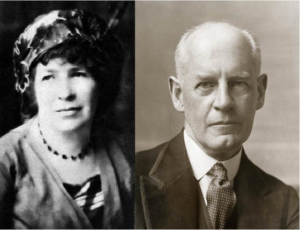
PEN Founder Catherine Amy Dawson Scott and first PEN President John Galsworthy
The idea of PEN [Poets, Essayists & Novelists—later expanding to Poets, Playwrights, Essayists, Editors and Novelists and now including a wide array of Nonfiction writers and Journalists] spread quickly. Clubs developed in France and throughout Europe, and the following year in America, and then in Asia, Africa and South America. John Galsworthy, the popular British novelist, became the first President. A decade later when he won the Nobel Prize for Literature, he donated the prize money to International PEN. Not everyone had grand ambitions for the PEN Club, but writers recognized that ideas fueled wars but also were tools for peace. Galsworthy spoke about the possibilities of a “League of Nations for Men and Women of Letters.”
Members of PEN began to gather at least once a year in 1923 with 11 Centers attending the first meeting. During the 1920’s writers regardless of nationality, culture, language or political opinion came together. As the political temperature rose in Europe, PEN insisted it was an apolitical organization though its role in the politics of nations was soon to be tested and ultimately landed not on a partisan or ideological platform but on a platform of ideals and principles.
At a tumultuous gathering at PEN’s 4th Congress in Berlin in 1926, tensions rose among the assembled writers, and the debate flared over the political versus non-political nature of PEN. Young German writers, including Bertolt Brecht, told Galsworthy that the German PEN Club didn’t represent the true face of German literature and argued that PEN could not ignore politics. Ernst Toller, a Jewish-German playwright, insisted PEN must take a stand.
After the Congress Galsworthy returned to London and holed up in the drawing room of PEN’s founder Catharine Scott where he worked on a formal statement to “serve as a touchstone of PEN action.” This statement included what became the first three articles of the PEN Charter. At the 1927 PEN Congress in Brussels, the document was approved and remains part of PEN’s Charter today, including the idea that “Literature knows no frontiers and must remain common currency among people in spite of political or international upheavals.” The third article of the Charter notes that PEN members “should at all times use what influence they have in favor of good understanding and mutual respect between nations and people and dispel all hatreds and champion the ideal of one humanity living in peace and equality in one world.”
As the voices of National Socialism rose in Germany, PEN’s determination to remain apolitical was challenged though the determination to defend freedom of expression united most members. At the 1932 Congress in Budapest the Assembly of Delegates sent an appeal to all governments concerning religious and political prisoners, and Galsworthy issued a five-point statement, a document that would evolve into the fourth article of PEN’s Charter.
When Galsworthy died in January 1933, H.G. Wells took over as International PEN President. It was a time in which the Nazi Party in Germany was burning in bonfires thousands of books they deemed “impure” and hostile to their ideology. At PEN’s 1933 Congress in Dubrovnik, H.G. Wells and the PEN Assembly launched a campaign against the burning of books by the Nazis and voted to reaffirm the Galsworthy resolution. German PEN, which had failed to protest the book burnings, attended the Congress and tried to keep Ernst Toller, a Jew, from speaking. Some members supported German PEN, but the overwhelming majority reaffirmed the principles they had just voted on the previous day. The German delegation walked out of the Congress and out of PEN and didn’t return until after World War II. Their membership was rescinded. “If German PEN has been reconstructed in accordance with nationalistic ideas, it must be expelled,” the PEN statement read. During World War II PEN continued to defend the freedom of expression for writers, particularly Jewish writers. (Today German PEN is one of PEN’s active centers, especially on issues of freedom of expression and assistance to exiled writers.)
PEN was one of the first nongovernmental organizations and the first human rights organization in the 20th century. PEN’s Charter, which developed over two decades, was one of the documents referred to when the Universal Declaration of Human Rights was drafted at the United Nations after World War II. In 1949 PEN was granted consultative status at the United Nations as “representative of the writers of the world,” and is today the only literary organization with formal consultative status with UNESCO.
In 1961 PEN formed its Writers in Prison Committee to work systematically on individual cases of writers threatened around the world. PEN’s work preceded Amnesty, and the founders of Amnesty came to PEN to learn how it did its work.
Today there are over 150 PEN Centers around the world in more than 100 countries. At PEN writers gather, share literature, discuss and debate ideas within countries and among countries, defend linguistic rights and defend writers around the globe imprisoned, threatened or killed for their writing. The development of a PEN center has often been a precursor to the opening up of a country to more democratic practices and freedoms as was the case in Russia in the late 1980’s and in other countries of the former Soviet Union and in Myanmar where a former prisoner of conscience was instrumental in forming a center there and was its first President. A PEN center is a refuge for writers in many countries.
Unfortunately, the movement towards more democratic forms of government and freedom of expression has been in retreat in the last few years in a number of these same regions, including in Russia and Turkey.
For more than 35 years I have been engaged with PEN, as a member, as the President of one of PEN’s largest centers, PEN Center USA West during the year of the fatwa against Salman Rushdie and Tiananmen Square, as Chair of PEN International’s Writers in Prison Committee (1993-1997), as International Secretary (2004-2007), and continuing as an International Vice President since 1996. I’ve also served on the Board and as Vice President of PEN America (2008-2015). I lived for six years in London, where PEN International is headquartered.
In the run-up to PEN’s Centenary, I was asked if I would write an account of PEN’s history as I’d seen it. I began by posting a blog twice a month, taking on small slices of the history in each narrative. This serial blog of PEN Journeys recounts PEN’s history as I’ve witnessed it as well as history of the period and personal history during those years. The narratives are framed by the times, featuring writers, including the fatwa against Salman Rushdie, the protests in Tiananmen Square, the fall of the Berlin Wall—PEN members or future PEN members were central in all these events—the collapse of the Soviet Union and the formation of PEN Centers there; the opening up of Eastern Europe with its PEN centers; the release of PEN “main case” Václav Havel and his ascendency to the Presidency of Czechoslovakia; the mobilization of Turkish PEN members in opposition to recurring authoritarian governments; PEN’s mission to Cuba; PEN’s protests over killings and impunity in Mexico; protests and gatherings in Hong Kong on behalf of imprisoned Chinese writers; the awarding of the Nobel Prize for Peace to PEN member and Independent Chinese PEN Center founder and President Liu Xiaobo.
PEN and its members have played a pivotal role in defending freedom of expression around the world, in challenging systems that trap citizens, and in at least two instances, in taking on the presidencies of the new democracies that emerged. The PEN Charter, which sets out the principles and ideals, has united the global organization and guided its members who have often been at the forefront or in the wings of important historical moments—celebrated and outspoken writers like Václav Havel, Nadine Gordimer, Margaret Atwood, Orhan Pamuk, Yaşar Kemal, Chinua Achebe, Wole Soyinka, Koigi wa Wamwere, Ngũgĩ wa Thiong’o, Arthur Miller, Anna Politkovskaya, Salman Rushdie, Ken Saro-Wiwa, Carlos Fuentes, Liu Xiaobo. The list is long, and I have had the privilege of interacting with many of them in PEN and also with hundreds of perhaps lesser known, but courageous writers who have stood watch and engaged.
The view of PEN Journey is global though the work is often local. As well as chronicling global events and personal history, PEN Journey recounts the shaping and re-imagining of this sprawling nongovernmental organization, one of the largest in terms of geographic reach. PEN has had to evolve and re-shape itself to serve its 155 autonomous centers. With at least 40,000 members around the globe in more than 100 countries, there are many stories others might tell, but this narrative is a close-up view of a period of time and of the writers who continue to work together in the belief that the world for all its differences and complexities can aspire to and perhaps even achieve “the ideal of one humanity living in peace and equality in one world.”* [*PEN Charter]
Because I tended not to throw away documents over the decades, I have an extensive paper as well as digital archive which I used to refresh memories and document facts. As I dug through files, I came across a speech I’d given which represents for me the aspirations of PEN, the programming it can do and the disappointments it sometimes faces.
At a 2005 conference in Diyarbakir, Turkey, the ancient city in the contentious southeast region, PEN International, Kurdish and Turkish PEN hosted members from around the world. The gathering was the first time Kurdish and Turkish PEN members shared a stage and translated for each other. I had just taken on the position of International Secretary of PEN and joined others at a time of hope that the reduction of violence and tension in Turkey would open a pathway to a more unified society, a direction that unfortunately has reversed.
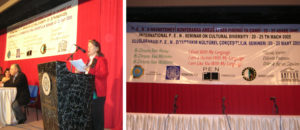
PEN International Secretary Joanne Leedom-Ackerman speaking at PEN International Conference on Cultural Diversity in Diyarbakir, Turkey, March 2005
The talk also references the historic struggle in my own country, the United States, a struggle which is ongoing. “The arc of the moral universe is long, but it bends toward justice,” Martin Luther King is quoted as saying. This is the arc PEN has leaned towards in its first century and is counting on in its second.
From Diyarbakir Conference:
When I was younger, I held slabs of ice together with my bare feet as Eliza leapt to freedom in Harriet Beecher Stowe’s UNCLE TOM’S CABIN.
I went underground for a time and lived in a room with a thousand light bulbs, along with Ralph Ellison’s INVISIBLE MAN.
These novels and others sparked my imagination and created for me a bridge to another world and culture. Growing up in the American South in the 1950’s, I lived in my earliest years in a society where races were separated by law. Even after those laws were overturned, custom held, at least for a time, though change eventually did come.
Literature leapt the barriers, however. While society had set up walls, literature built bridges and opened gates. The books beckoned: “Come, sit a while, listen to this story…can you believe…?” And off the imagination went, identifying with the characters, whatever their race, religion, family, or language.
When I was older, I read Yasar Kemal for the first time. I had visited Turkey once, had read history and newspapers and political commentary, but nothing prepared me for the Turkey I got to know by taking the journey into the cotton fields of the Chukurova plain, along with Long Ali, Old Halil, Memidik and the others, worrying about Long Ali’s indefatigable mother, about Memidik’s struggle against the brutal Muhtar Sefer, and longing with the villagers for the return of Tashbash, the saint.
It has been said that the novel is the most democratic of literary forms because everyone has a voice. I’m not sure where poetry stands in this analysis, but the poet, the dramatist, the artistic writer of every sort must yield in the creative process to the imagination, which, at its best, transcends and at the same time reflects individual experience.
In Diyarbakir/Amed this week we have come together to celebrate cultural diversity and to explore the translation of literature from one language to another, especially to and from smaller languages. The seminars will focus on cultural diversity and dialogue, cultural diversity and peace, and language, and translation and the future. This progression implies that as one communicates and shares and translates, understanding may result, peace may become more likely and the future more secure.
Writing itself is often an act of faith and of hope in the future, certainly for writers who have chosen to be members of PEN. PEN members are as diverse as the globe, connected to each other through PEN’s 141 centers in 99 countries. [Now 155 centers in over 100 countries.] They share a goal reflected in PEN’s charter which affirms that its members use their influence in favor of understanding and mutual respect between nations, that they work to dispel race, class and national hatreds and champion one world living in peace.
We are here today as a result of the work of PEN’s Kurdish and Turkish centers, along with the municipality of Diyarbakir/Amed. This meeting is itself a testament to progress in the region and to the realization of a dream set out three years ago.
I’d like to end with the story of a child born last week. Just before his birth his mother was researching this area. She is first generation Korean who came to the United States when she was four; his father’s family arrived from Germany generations ago. I received the following message from his father: “The Kurd project was a good one! Baby seemed very interested and has decided to make his entrance. Needless to say, Baby’s interest in the Kurds has stopped [my wife’s] progress on research.”
This child will grow up speaking English and probably Korean and will also have a connection to Diyarbakir/Amed because of the stories that will be told about his birth. We all live with the stories told to us by our parents of our beginnings, of what our parents were doing when we decided to enter the world. For this young man, his mother was reading about Diyarbakir/Amed. Who knows, someday this child who already embodies several cultures and histories, may come and see for himself this ancient city, where his mother’s imagination had taken her the day he was born.
It is said Diyarbakir/Amed is a melting pot because of all the peoples who have come through in its long history. I come from a country also known as a melting pot. Being a melting pot has its challenges, but I would argue that the diversity is its major strength. In the days ahead I hope we scale walls, open gates and build bridges of imagination together.
–Joanne Leedom-Ackerman, International Secretary, PEN International, March 2005
PEN Journey 41: Berlin—Writing in a World Without Peace
PEN International celebrates its Centenary in 2021. I’ve been active in PEN for more than 30 years in various positions and now as an International Vice President Emeritus. With memories stirring and file drawers of documents and correspondence bulging, I am a bit of a walking archive and have been asked by PEN International to write down memories. I hope this personal PEN journey will be of interest.
I first visited Berlin in the fall of 1990 just after Germany reunited. I was living in London and took my sons, ages 10 and 12, to witness history in the making. I returned on a number of occasions, researching scenes for a book, attending meetings, and visiting German PEN in preparation for PEN’s 2006 Congress. Each time Berlin’s face was altered as the municipalities east and west moved to become one city again.
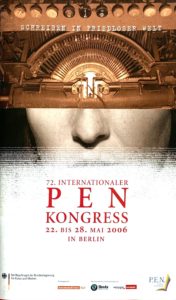
PEN International’s 72nd World Congress, Berlin, 2006
At the time of PEN’s Congress in May 2006, Berlin was bedecked with water pipes above ground—pink, green, blue, red—before the city buried its plumbing and infrastructure beneath the streets. Portions of the city had the appearance of an amusement park; there were also sections of the Berlin Wall with its colorful graffiti still standing, more as art exhibit than stark barrier to freedom.
“Welcome to a United Berlin” the German PEN President headlined his letter to the 450 delegates and participants for PEN’s 72nd World Congress. The Congress theme “Writing in a World Without Peace” was challenged by the reunification of Berlin and Germany, a historic event which bode well for the prospects of peace and which stood in contrast to the history that had come before. Yet the globe was still in conflict in the Middle East, in Asia and in Latin America where writers were under threat.
“There are countries such as Iran, Turkey or Cuba, where authors are jailed because of their books,” noted International PEN President Jiří Gruša. Resolutions at the Congress addressed the situations for writers imprisoned or killed in China, Cuba, Iran, Mexico, Russia/Chechnya, Sri Lanka, Uzbekistan, Vietnam, and other countries.
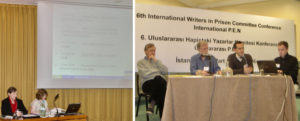
Left: Writers in Prison Committee (WiPC) meeting at Berlin Congress. Karin Clark (Chair WiPC) and Sara Whyatt (WiPC Program Director). Right: WiPC Conference in Istanbul: Eugene Schoulgin (Norwegian PEN/PEN Board), Jens Lohman (Danish PEN), Jonathan Heawood (English PEN), Notetaker
Two months before in March, over 60 writers from 27 PEN centers in 23 countries had gathered for International PEN’s Writers in Prison Committee conference in Istanbul where the WiPC planned a campaign against insult and criminal defamation laws under which writers and journalists were imprisoned worldwide. The conference also addressed the recent uproar over the Danish cartoons, impunity and the role of internet service providers offering information on writers, especially in China. A working group formed to support the Russian PEN Center which was under pressure from the Russian government.
Berlin, however, was sparkling and filled with the energy of reunification. “Today, this city—once separated by a Wall most drastically manifesting the division of Germany and Europe—has not only been re-established as the capital of Germany, but has simultaneously turned into a thriving meeting-place between East and West and North and South,” welcomed Johano Strasser, German PEN President. “Here in Berlin, history in all its facets—from the great achievements of German artists, philosophers and scientists to the crimes of the Nazis—has left its mark on the urban landscape.”
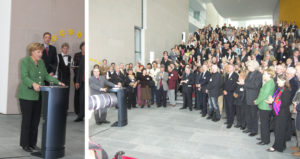
Left: German Chancellor Angela Merkel addressing PEN members at 72nd PEN Congress, 2006; Right: PEN International President Jiří Gruša speaking to PEN delegates and members at the Federal Chancellery; front row: German PEN President Johano Strasser, Chancellor Angela Merkel and PEN International Secretary Joanne Leedom-Ackerman. [Photo credit: Tran Vu]
The keynote address by Nobel laureate Günter Grass challenged the conflicts around the globe and the countries engaged in them. “There has always been war. And even peace agreements, intentionally or unintentionally, contained the germs of future wars, whether the treaty was concluded in Münster in Westphalia, or in Versailles,” he said.
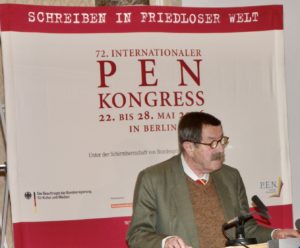
Nobel laureate Günter Grass addressing Opening Ceremony of PEN International’s 72nd World Congress in Berlin, 2006 [Photo credit: Tran Vu]
As I sat on the dais on the edge of the stage listening to this renowned German writer, I leaned over to Jiří and said, If there is a standing ovation, I can’t stand. I was concerned. Grass could say and think whatever he wanted, but PEN was a non-political organization. Whatever my views of my country’s foreign policy, I was an American; I was also the mother of a son in uniform. Jiří leaned back to me and said in effect: Don’t worry, I won’t stand either. The speech ended with applause but no ovation, and then everyone got up and went to the next event.
It wasn’t my role to argue with Günter Grass even had the occasion allowed. But it was important that PEN assure the open space for debate existed which it did later in the Congress workshops and programs. PEN was filled with a multitude of points of view among its members; it did not have a litmus test of politics, only a commitment to the free expression of ideas. It offered a wide tent where views could be debated and challenged. Dogmatic political certainties often fell on their own in the alchemy of literature and imagination.
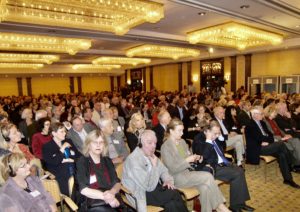
PEN members and delegates from around the world at Opening Ceremony of 2006 PEN Congress [Photo credit: Tran Vu]
Programs at the Congress also featured Nobel laureate and PEN International Vice President Nadine Gordimer and writers from around the world, including former International PEN Presidents Ronald Harwood, and György Konrád, Bei Dao, A.L. Kennedy, Margriet de Moor, Péter Nádas, Per Olov Enquist, Mahmoud Darwish, Duo Duo, Jean Rouaud, Johano Strasser, Veronique Tadio, Patrice Nganang and others. These writers participated in the literary events, including an evening of African literature and one of writers of German literature who had immigrated from abroad to Germany or had non-German cultural backgrounds. Afternoon literary sessions included prominent PEN writers introducing authors of their choice, an afternoon of essays and discussions on the theme Writing in a World without Peace and a lyric poetry afternoon.
PEN’s 85th anniversary coincided with the 60th anniversary of the United Nations. Both organizations had been founded after a World War out of an idealism that arose from desperate times with the hope that the future could be better than what had just transpired. “Both organizations were founded on a belief in dialogue and an exchange of ideas across national borders,” I noted in my address to the Assembly of Delegates. “When U.N. members were writing the Universal Declaration of Human Rights, the framers consulted, among other documents, PEN’s Charter.”
PEN also had a history with the city of Berlin, where PEN members had gathered in 1926 for the first international meeting of importance held in Berlin after World War I. At that Berlin Congress tensions had arisen among old and young writers, writers from the west and the east, and debate had flared about the political versus the nonpolitical nature of PEN. The debate that stirred in Berlin in part led to the framing of PEN’s Charter the following year.
Since those early days, PEN had grown in size beyond what the founding writers might ever have imagined. After the 2006 Berlin Congress, with the addition of centers in Jamaica, Uruguay, and Pretoria, South Africa, PEN had 144 centers in 101 countries in almost every time zone. The PEN world didn’t sleep. Someone, somewhere was always awake doing something. Through its centers PEN International participated in at least a dozen conferences around the world each year, including meetings of its standing committees. PEN thought globally but worked locally.
Berlin—with its own alterations and progress—proved a fitting location for the presentation of International PEN’s new Three-Year Plan. For the past decade, since the 75th Anniversary at the Congress in Guadalajara, PEN International had been in an organizational reformation. It now had a governing structure with a global Board that participated in decision-making; it had revised its Constitution and Rules and Regulations; it had developed a budget, increased its funding, and recently moved its offices into Central London to a larger space with cheaper pro rata rent and an elevator, which had meaning for anyone who had climbed the steep four (or five?) flights to PEN’s old offices. The staff size had also increased, and PEN had hired its first Executive Director, Caroline McCormick Whitaker, former Development Director from the British National History Museum.

International PEN Board meeting preceding 72nd PEN Congress in Berlin, May 2006. L to R: Eugene Schoulgin (Norwegian PEN), Judith Rodriguez (Melbourne PEN), Kata Kulakova (Chair Translation & Linguistic Rights Committee), Sylvestre Clancier (French PEN), Sibila Petlevski (Croatian PEN), Chip Rolley (Chair Search Committee), Karen Efford (Program Officer), Caroline McCormick Whitaker (Executive Director), Joanne Leedom-Ackerman (PEN International Secretary), Jiří Gruša (International PEN President), Peter Firkin (standing—Centers Coordinator), Eric Lax (PEN USA West), Jane Spender (Programs Director), Judith Buckrich (Women Writers Committee Chair)
Because British charitable tax law had changed, the opportunity had also arisen to unite International PEN and the International PEN Foundation into one charitable organization: International PEN, Ltd, a step that would provide the legal framework and protection for the organization and PEN’s name, would limit personal financial liability of the Board and attract a wider funding base. At the Berlin Congress, resolutions and approval were endorsed for this step which would be finalized the following year at the 2007 Congress in Dakar.
Caroline Whitaker took the Assembly of Delegates through the Three-Year Plan which had been developed after widespread consultation with PEN centers and the Board. She acknowledged that PEN couldn’t do everything that everyone wanted right away, that it was necessary to focus resources even as PEN developed more resources.
The Plan, which had grown out of all the discussions and preceding plans, concentrated on PEN’s three missions: to promote literature, to protect freedom of expression and to build a community of writers. “International PEN will work regionally to connect the activity of its many Centers around the globe on these issues,” Caroline told the delegates.

All PEN’s Standing Committees met at Berlin Congress—Writers in Prison Committee, Translation and Linguistic Rights Committee, Women Writers Committee and Peace Committee [Photo credit: Tran Vu]
In helping to develop PEN’s centers, the Three-Year Plan recommended International PEN focus on one region at a time, beginning with Africa where the 2007 PEN Congress would be held. International PEN would assist in programming and fundraising for development of PEN’s African Centers. The next regional focus would be Latin America, where PEN’s 2008 Congress was to be held. This rolling focus would allow the limited international staff to plan strategically. Regular daily work would still continue for the needs of centers in all regions.

PEN members met in workshops at 72nd Berlin Congress. Topics: PEN in the World—Global Issues; Education; the Strategic Plan; Centers; Networks and Partners; Asia and Central Asia; Middle East; Africa; Europe and Americas [Photo credit: Tran Vu]
As International PEN’s work had taken me across the globe that year, I’d come to see that PEN and its members formed a kind of intricate net which helped hold civil society together, the kind of sturdy net used on hills to prevent landslides. In a way that is what PEN members did around the world. They helped prevent literary culture and languages and freedom of expression from slipping away by both their active programming and their defensive actions
At the 1926 PEN Congress in Berlin International PEN’s President John Galsworthy and PEN’s founder Catherine Amy Dawson Scott had their voices recorded and preserved in a project of the German state. Galsworthy read a page from his Forsyte Saga. According to Dawson Scott’s journal, she recorded the following: “Even as individuals become families and families become communities and communities become nations, so eventually must the nations draw together in peace.”
It was a worthy, if not yet realized goal, but at least in PEN we had a global family.

Mayor’s reception for PEN members and participants at 72nd World Congress in Berlin, May 2006 [Photo Credit: Tran Vu]
Elections at 2006 Congress:
International PEN President: Jiří Gruša was re-elected for further 3-year term.
International PEN Board: Cecilia Balcazar (Colombian Center) and Eugene Schoulgin (Norwegian PEN re-elected to the Board)
Vice Presidents: Toni Morrison (American PEN) and J.M. Coetzee (Sydney PEN) elected Vice Presidents for service to literature and Gloria Guardia (Panamanian Center) for service to PEN
Women Writers Committee: Judith Buckrich (Melbourne Center) re-elected as Chair
Translation and Linguistic Rights Committee: Carles Torner (Catalan PEN) stood down as Vice Chair, replaced by Josep Maria Terricabras (Catalan PEN)
Next Installment: PEN Journey 42: From Copenhagen to Dakar to Guadalajara and in Between
PEN Journey 40: The Role of PEN in the Contemporary World
PEN International celebrates its Centenary in 2021. I’ve been active in PEN for more than 30 years in various positions and now as an International Vice President Emeritus. With memories stirring and file drawers of documents and correspondence bulging, I am a bit of a walking archive and have been asked by PEN International to write down memories. I hope this personal PEN journey will be of interest.
At the end of September 2005 a Danish newspaper published 12 editorial cartoons which depicted Mohammed in various poses as part of a debate over criticism of Islam and self-censorship. Muslim groups in Denmark objected, and by early 2006 protests, violent demonstrations and even riots erupted in Muslim areas around the world. The offense was the “blasphemy” of drawing Mohammed in the first place and the particular mockery of some of the depictions in the cartoons.
The uproar over the Jyllands-Posten Mohammed cartoons quickly drew PEN into the controversy, first through Danish PEN and then through the International PEN office and other PEN Centers. PEN included many Muslim members and numbers of centers in majority Muslim countries. All PEN members and centers endorse the ideals stated in the PEN Charter. However, the third and fourth articles of the Charter which addressed the situation, also at times appeared to contradict each other:
Article 3: “Members of PEN should at all times use what influence they have in favour of good understanding and mutual respect between nations and people; they pledge themselves to do their utmost to dispel all hatreds and to champion the ideal of one humanity living in peace and equality in one world.”
Article 4: “PEN stands for the principle of unhampered transmission of thought within each nation and between all nations, and members pledge themselves to oppose any form of suppression of freedom of expression in the country and community to which they belong as well as throughout the world wherever this is possible. PEN declares for a free press and opposes arbitrary censorship in time of peace. It believes that the necessary advance of the world toward a more highly organized political and economic order renders a free criticism of governments, administrations and institutions imperative. And since freedom implies voluntary restrain, members pledge themselves to oppose such evils of a free press as mendacious publication, deliberate falsehood and distortion of facts for political and personal ends.”
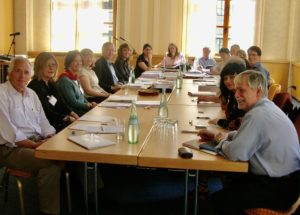
PEN International Board and Staff 2006. L to R: Eric Lax (PEN USA West), Elizabeth Nordgren (Finish PEN), Jane Spender (Programs Director) Sara Whyatt (Writers in Prison Committee Director), Eugene Schoulgin (Norweigan PEN), Caroline McCormick Whitaker (Executive Director), Karen Efford (Programs Officer), Joanne Leedom-Ackerman (International Secretary), Jiří Gruša (International President), Judith Rodriguez (Melbourne PEN), Britta Junge-Pederson (Treasurer), Judith Buckrich (Women Writers Committee Chair), Chip Rolley (Search Committee Chair), Sylvestre Clancier (French PEN), Sibila Petlevski (Croatian PEN), Peter Firkin (Centers Coordinator) [not pictured: Mohammed Magani (Algerian PEN), Karin Clark (WiPC Chair), Kata Kulavkova ( Translation and Linguistic Rights Chair)
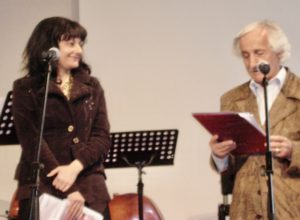
Peace Committee program 2006. Sibila Petlevski (Croatian PEN), Veno Taufer (Peace Committee Chair)
At the Peace Committee conference that April, I observed, “The Charter of PEN asserts values that can appear contradictory, but represent the dialectic upon which free societies operate and tolerate competing ideas…In our 85th year, International PEN still represents that longing for a world in which people communicate and respect differences, share culture and literature, and battle ideas but not each other.”
The Danish cartoon controversy led off 2006. For me, the PEN year also included attending the conferences of three of PEN’s four standing committees—the Peace Committee in Bled, Slovenia, Writers in Prison Committee in Istanbul, Turkey (PEN Journey 35) and Translation and Linguistic Rights Committee in Ohrid, Macedonia (PEN Journey 39)—and in May the 72nd PEN World Congress in Berlin, and later a Danish Conference on the Middle East in Copenhagen, the Gothenburg Book Fair in Sweden, a PAN Africa Conference in Dakar, Senegal and a trip to Moscow, where I went to watch my oldest son compete in the European Wrestling Championships and visited Russian PEN on a mission.
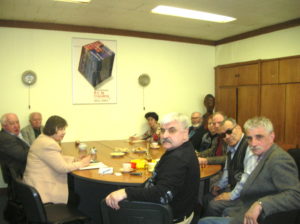
Russian PEN members meeting in Russian PEN office, including Alexander Tkachenko, General Secretary, 2006
To Moscow I took just under $10,000 raised by PEN centers and buried in my luggage to help the Russian PEN Center. Vladimir Putin and the Russian government had begun to crackdown on nongovernmental organizations with ties to other countries. One of their first targets was Russian PEN which had opposed the legislation restricting nongovernmental organizations. At the time I was also on the board of Human Rights Watch, a larger organization which was watching closely what was happening to PEN. The government’s attack on Russian PEN came in the form of a freeze on all assets for failure to pay a land tax. Russian PEN argued that it was a legal tenant where it had been conducting business and was not liable for the tax on the land, but the tax office refused to drop the charges. The government threatened to close PEN and take away its office if the money wasn’t paid. An appeal had gone out to PEN’s other centers, which had responded from around the globe not only with protests to Moscow but also with funds for Russian PEN.
I brought in funds just under the amount I would have had to declare. During the wrestling tournament I met with Alexander (Sascha) Tkachenko, the General Secretary of Russian PEN, and delivered to him the donation, and he gave me a receipt. The funds stayed off the crisis for then. Charges were dropped. A Russian Minister said, “I don’t understand. I was getting letters from as far away as Argentina!” Sascha answered him: “That is the kind of organization we are.” PEN continued to operate.
In Moscow I also met with Russian PEN members as well as with Turkmen author Rakhim Esenov, who was visiting Russian PEN. I had met Esenov a few weeks before in New York where he had won PEN America’s Barbara Goldsmith Freedom to Write award. In Turkmenistan Esenov had been charged with “inciting social, national and religious hatred using the mass media” because of characters in his novel The Crowned Wanderer. Set in the 16th century Mogul Empire, the story focused on a poet/philosopher/army general who was said to have saved Turkmenistan from fragmentation. The president of Turkmenistan Saparmurad Niyazov banned the book for portraying the main character as a Shia rather than a Sunni Muslim, and he imprisoned Esenov for several months. I still have the massive Russian language volume he shared with me, a work that had taken him years to write.
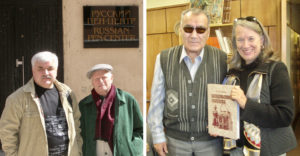
L to R: Russian PEN General Secretary Alexander (Sascha) Tkachenko and Russian PEN member outside Russian PEN office in Moscow and Rakhim Esenov, author of The Crowned Wander and Joanne Leedom-Ackerman (PEN International Secretary), 2006
At the Peace Committee conference earlier that month I’d presented a paper on the conference theme “The Role of PEN in the Contemporary World,” a broad and challenging topic which had inspired me to peer both backward and forward.
Below is the beginning of that paper with a link to the rest:
My first memory of a PEN meeting was sitting in someone’s living room in Los Angles writing postcards to free Wei Jingsheng from prison in China. At the time in the 1980’s he’d already been in prison several years of a fifteen-year sentence. I had no idea who this writer was thousands of miles away. I barely knew the other writers in that living room. On the coffee table would have been PEN’s Case List, which at the time was white sheets of paper stapled together.
We wrote and stamped our post cards for Wei and other writers that afternoon. I’m sure we were provided with background on his case. I pictured these cards fluttering into a jail somewhere in China and perhaps even into the cell of this stranger to let him know we had taken note of him and cared what happened. Looking back on the blue-sky afternoon as we sipped sodas and ate crackers and cheese, I see our act as a bit fleeting, an effort to imagine the fate of another writer who didn’t have our freedom to write and speak…[continue reading here]
Next Installment: PEN Journey 41: Berlin—Writing in a World Without Peace
PEN Journey 39: Spiritus Loci—Literature as Home
PEN International celebrates its Centenary in 2021. I’ve been active in PEN for more than 30 years in various positions and now as an International Vice President Emeritus. With memories stirring and file drawers of documents and correspondence bulging, I am a bit of a walking archive and have been asked by PEN International to write down memories. I hope this personal PEN journey will be of interest.
[From address at Translation and Linguistic Rights Committee Conference September, 2006:]
I Left My Shoes in Macedonia.
Last year at this conference, I packed in a rush, left behind a pair of shoes, but in the process got a title for a story.
I Left My Shoes in Macedonia.
I don’t yet know what story will emerge, or maybe only this brief talk will emerge, but Macedonia makes the title work, at least to my mind. I Left My Shoes in England…that doesn’t work…I Left My Shoes in France?…No. I Left My Shoes in the United States…please. I look forward to discovering who left the shoes and what the circumstances were and most of all what Macedonia has to do with the story.
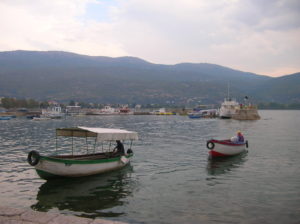
Ohrid, Macedonia, setting of PEN International Translation and Linguistic Rights Committee conference, 2006.
Exploring the conference theme spiritus loci will be part of the journey. As writers we know the power of place in literature and in our lives. The Latin term meaning the local spirit of a place is not always easily defined, but it relates to the geography, the history, the architecture and the people, who are both shaped by and shape the place. The ancient Romans thought every location had a spirit, some benign where people would live longer, happier lives and some evil and destructive of human well-being.
Today in a world grown smaller and more connected by jet travel, the internet, the global village, the cyber global village, with the blending of cultures and commerce worldwide, spiritus loci is perhaps a more fluid concept and to a younger generation, even a digital concept. On the internet I discovered a recording studio with the name Spiritus Loci; it moved from place to place recording people’s music wherever the musicians felt most comfortable.
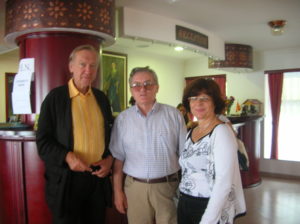
Eugene Schoulgin (Norwegian PEN) Dimitar Basevski (President Macedonian PEN), and Kata Kulavkova (Macedonian PEN & Chair PEN International’s Translation and Linguistic Rights Committee)
It is still the writer who can best capture a place and a people and render that spiritus loci for the reader. The best writers unveil the unity between location and character so that the writer’s version becomes the backdrop for understanding the place for generations to come, whether it be Tolstoy’s Russia, Balzac’s France, Dickens’ England, Achebe’s Nigeria, Toer’s Indonesia, Fuentes’ Mexico.
Through PEN we have the opportunity to know writers and their literature from around the globe and also to visit and experience the places from which they come. I’ve had the pleasure of coming to Macedonia four times and to this most beautiful city of Ohrid because of PEN.
With 144 centers in 101 countries, PEN has members who live and operate in most regions of the globe, with different histories, geographies, races, religions, cultures, but with the common spiritus loci of ideals. Today, these ideals, which were developed between World Wars, continue to promote a shared humanity on earth. PEN members work to use “what influence [we] have in favor of good understanding and mutual respect between nations…to do [our] utmost to dispel race, class and national hatreds, and to champion the idea of one humanity living in peace in the world.” This mandate provides its own kind of spiritus loci no matter where one lives. It is a compass that points both to the ground we occupy and the future we hope to achieve.
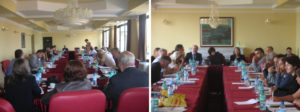
Meeting at 9th Ohrid Conference of PEN International’s Translation and Linguistic Rights Committee, 2006
Macedonia and its neighbors have been at the center of the struggle for those ideals in the last decade. In 2001 when the fires from the Balkan wars were still smoldering, PEN postponed its International Congress in Ohrid until the conflict in Macedonia subsided. Fortunately we were able to be hosted at a Congress in Ohrid the following fall. When PEN members look at that troubled time in Macedonia only a few years ago and at the current devastating conflicts in the Middle East, it is worth reflecting on how thought evolves, how cultures are translated to each other, and how we can best apply the spiritus loci of our ideals.
When a people find their home destroyed whether by natural disaster or by war, the concept of spiritus loci is problematic. The role of literature is especially important at that time. Literature provides a home in the mind and reveals the humanity we all share—the spiritus loci of the human spirit. Let us not underestimate this power of ideas and writing to transform.
I Left My Shoes in Macedonia. Perhaps the character will return to find the shoes and also to discover what Macedonia might teach. I am at least lucky enough to have returned, and I look forward to seeing what I will learn…wearing my new shoes.
—Joanne Leedom-Ackerman
Next Installment: PEN Journey 40: The Role of PEN in the Contemporary World
PEN Journey 29: Mexico City and the Road Ahead—Part I, Form
PEN International celebrates its Centenary in 2021. I’ve been active in PEN for more than 30 years in various positions and now as an International Vice President Emeritus. With memories stirring and file drawers of documents and correspondence bulging, I am a bit of a walking archive and have been asked by PEN International to write down memories. I hope this personal PEN journey will be of interest.
A PEN International World Congress is a hybrid—a mini-UN General Assembly with delegates sitting at tables behind their center’s (and often country’s) name plates discussing world affairs that relate to writers; an academic conference with panelists addressing abstract philosophical themes; a literary festival with writers reading their poetry and stories and sharing books, and finally a civic engagement with resolutions passed on global issues which are then delivered, sometimes by a march or candlelight vigil to a country’s embassy that is oppressing writers.
Heads of state and UN officials frequently visit and/or speak at PEN Congresses depending on the openness of the host country; esteemed writers, including Nobel laureates, and former PEN main cases are often guests. The Congress’ size varies depending on the resources available, but the financial commitment is out of reach for many PEN Centers.
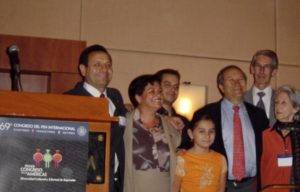
PEN International 69th Congress 2003. L to R: PEN main case General José Francisco Gallardo and family; Homero Aridjis, PEN International President; Terry Carlbom, PEN International Secretary; Nadine Gordimer, PEN International Vice President. (photo courtesy of Sara Whyatt)
The 2003 International PEN Congress in Mexico City was celebrated as the First Congress of the Americas. Hosted by Mexican PEN, it was also supported by Canadian PEN, Quebecois PEN, American PEN, and the Latin American PEN Foundation. It was the final Congress under the presidency of Mexican poet and novelist Homero Aridjis. Organized around the theme of “Cultural Diversity and Freedom of Expression,” the 69th Congress welcomed delegates from 72 PEN Centers from every continent except Antarctica. At the Assembly six new centers were admitted—Afghanistan, Morocco, Paraguay, Spain, Trieste, and Zambia; three dormant centers—Chilean, Kenyan and German-speaking Writers Abroad—were reinstated as active.
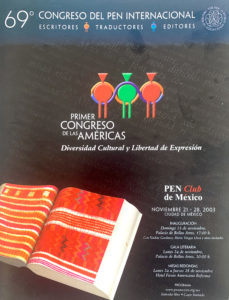
PEN International First Congress of the Americas 2003 in Mexico City. Theme: Cultural Diversity and Freedom of Expression
The admission of new centers was especially celebratory because of the number and the variety, leading with Afghanistan. Two delegates—a man and a woman—had traveled from Kabul in spite of the conflict in the country. Eugene Schoulgin, chair of the Writers in Prison Committee and member of Norwegian PEN, had visited Afghanistan twice that year along with Norwegian PEN member Elisabeth Eide. Eugene told the Assembly how impressed they were by the courage and vitality of the Afghan writers. “For them, after so many years of war, it was extremely important to open a window to the world through which they could look outwards and through which others could be introduced to their rich literature and culture and become friends in this tormented part of the world.”
Twenty Afghan writers had rented space in Kabul for a writers house, signed the PEN Charter and sent it to London with their membership application. (Less than a decade later there were 1000 members of Afghan PEN.) The Afghan delegate Partaw Naderi told the Assembly in order to reflect the major languages and communities in Afghanistan, the center planned to have a Pashtun language section, a Persian language section, and a section for Uzbek, Turkmen and other local people. In the last three decades writers had become refugees, mainly in Pakistan and Iran and some in the West, he said. Now one of the cultural centers in Kabul was ready to publish work by some of them though “freedom of expression was very, very limited” with frequent attacks and killings of writers and journalists. He had made the long trip to attend PEN’s Congress in order “to be among kind people,” and he profoundly wished for democracy and freedom of speech in Afghanistan.
Alexander Tkachenko of Russian PEN and a PEN International Board member observed that the Soviet Union had brought great trouble for 20 years to the Afghan people, their culture and literature, and he apologized for this and gave support to the new PEN center.
In response, Safia Siddiqi, the second Afghan delegate, said writers were not enemies; it was the governments. “Pens did not kill people, pens constructed things and helped people to join together in friendship,” she said, urging “their brother from Russia,” not to feel that writers were ever the enemy of each other. Thanking all who had made this trip possible, she noted it was also important that women participate and overcome restrictions and cross boundaries to come to places like Mexico.
Every new PEN center has its own story and mandate. I expand here on only one more at the Mexican Congress because that center’s raison d’etre also represented a change that was about to be voted on regarding PEN’s Charter.
The Trieste Center’s organizing principle was not nationality—it was located in Northern Italy—nor a single language—the writers spoke and wrote in Italian and many other languages—but culture as an organizing principle. The majority of PEN Centers were formed around geographic and national locations such as the new Morocco, Paraguay and Zambian centers. Countries can have as many as five centers if the nation is large like Russia, China and the U.S. or if there are multiple languages originating within its borders such as Spain which now had three centers—Catalan, Galician and Spanish centers or like Switzerland which had four centers—Swiss Romand, Swiss German, Swiss Italian-Reto-Romanish, and Esperanto. A few centers were formed in exile when the host country was not free enough for a PEN Center like Vietnamese Writers Abroad or Cuban Writers in Exile centers.
The Trieste Center was unusual. Endorsing the new center, Giorgio Silfer of Esperanto PEN observed that PEN centers did not represent nations; they represented literature, and literature did not need a nation to give it identity—as was the case with Yiddish, Roma and Esperanto. Literature established its own territory, and when a language was dead, its literature was simply and only an expression of connection with memory, he said. Trieste was a unique place, a cosmopolitan city: its writers in Italian were the expression of a culture that was not exactly Italian culture, but which incorporated expressions from other linguistic traditions.
Tone Persak of Slovene PEN added that Trieste had been “the town in the open space, on the open wind.” There had been extraordinary writers in different languages there: Italian, Slovene, English, Spanish, Croatian, Serbian, Yiddish, German, Friulian and so on. James Joyce, Rainer Maria Rilke, Italo Svevo, Juan Octavio Prenz. It had been a town of many conflicts but also the town of the cohabitation of different cultures.
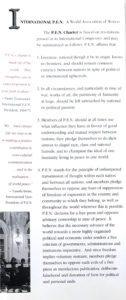
PEN International’s Charter before amendments in earlier brochure
Serbian delegate Vida Ognjenović and Croatian delegate and PEN International Board member Sibila Petlevski highlighted the multilingualism in Trieste and observed that the current situation after many, many Balkan wars had created an environment in Trieste where a PEN Center whose members came from different nations could cooperate with the Italian Center and all the other Centers in the region and give rise to new ideas. The Trieste Center was accepted.
The following day an amendment to PEN’s Charter was approved, the first change to this central document since the Charter’s text was agreed at the 1948 Copenhagen Congress. Literature’s origin beyond nationality informed the amendment which had been presented at the 2002 Macedonian Congress and vetted over the past year. The revision was a simple deletion of words. The Charter’s first item would now read: “Literature [deleted “national though it be in origin”] knows no frontiers and must remain common currency among people in spite of political or international upheavals.”
At the Mexico Congress another amendment was proposed and discussed for the fourth item in the Charter and would have a year for further consultation. The vote would come at the 2004 Congress. Both amendments involved a fine-tuning of words, reflected in the many pages of minutes, and an attention and passion for language and the translation of language which only a gathering of writers would have patience for.
These amendments and the changes proposed for the Regulations that evolved in the strategic planning process were shepherded by the International Secretary Terry Carlbom and especially by the Administrative Director Jane Spender whose patience and humor and intelligence kept everyone on track. The laborious task of taking more than 130 delegates through 30 Articles, often with subsets, fell to PEN International Board Member Eric Lax whose Sisyphean patience and care led the Assembly item by item. Ultimately all the recommended changes to the governance and structure of International PEN were approved.
The highlights involved the role and authority of the International PEN Foundation which focused on gathering resources for PEN and whose trustees had a voice on the Board but were also governed by the Board; the roles and authority of the International Secretary, the President and Board. The International President was to be a “distinguished writer of international literary reputation,” and the International Secretary was to have “actively participated in the affairs of International PEN” and was given a vote on the Board. These relationships were a moving target and would remain so over the years to come. In 2003 the President was given the discretion to lead and chair the Board and the Assembly but not the obligation so the role would depend on who occupied the office. A more formal Search Committee was established to seek out candidates for the positions of President, International Secretary and Board and to be elected by the Assembly on nomination by the Board. Chairs of both standing and special committees could attend regular board meetings but had no vote.
Deputy Chair of the Board Judith Rodriguez (Melbourne PEN) reported to the Assembly that the first Aim of the Strategic Plan, “Building the community of writers” included the item “expand PEN’s presence around the world and, in doing so, develop its humanitarian and cultural mission.” PEN was now pursuing a policy of cooperation with other organizations, initiated by the International Secretary’s signing of a cooperation agreement between International PEN and the European-Pacific Congress Alliance. The full Strategic Planning document would continue through a consultative process with the centers and be on the agenda for approval at the 2004 Congress in Tromso, Norway.
Parsing through, revising, getting approval of strategic plans and regulations for an organization as complex and diverse as PEN was a tedious but necessary task and reminded me of the book title “The Anarchists’ Convention.” Though rules and regulations and strategic plans would change in the years ahead, the Mexico Congress document was a base from which PEN grew and shape-shifted. Those who sat in the large Fiesta Americana ballroom can perhaps still hear Eric’s patient voice: “And now turn to Article 23…Comments…There being no further discussion, Article 23 is approved. Now turn to Article 24…”
Next Installment: PEN Journey 29: Mexico City and the Road Ahead—Part II, Substance
PEN Journey 27: San Miguel de Allende and Other Destinations—PEN’s Work Between Congresses
PEN International celebrates its Centenary in 2021. I’ve been active in PEN for more than 30 years in various positions and now as an International Vice President Emeritus. With memories stirring and file drawers of documents and correspondence bulging, I am a bit of a walking archive and have been asked by PEN International to write down memories. I hope this personal PEN journey will be of interest.
Over the years I’ve used various metaphors to describe PEN International—a giant wheel with 140+ spokes that reach out into the corners of the globe. A vast orchestra with the string, woodwind, brass and percussion sections scattered across the map, directed by local conductors and the Secretariat in London.
PEN’s core is an idea, codified in its Charter, acted upon by writers around the world organized into PEN centers. These writers and centers gather intensity as they work together.
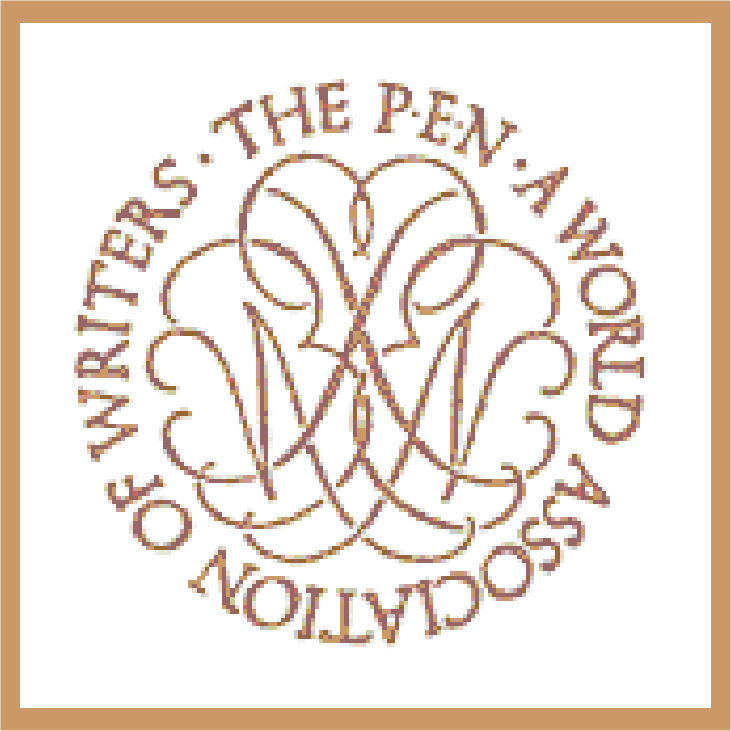
PEN International logo in 2002
Writers in a country or region or language are empowered to work as a center of PEN by the whole body of centers—the Assembly of Delegates—which vote on a center’s membership at PEN’s annual Congresses. During the months in between, PEN centers act both individually and collectively—celebrating and presenting literature in the many cultures and languages, mobilizing on issues of freedom of expression, acting to preserve and celebrate languages and translation, in particular minority languages, discussing and debating issues of peace, addressing the situation of women writers, and assisting and protecting writers who find themselves in exile. All of this activity between the annual Congresses occurs in the PEN centers and in the work of PEN International’s standing committees and at regional conferences which convene during the year.
I take a moment here to set out this template because in the PEN Journeys I’ve been focusing in large part on PEN’s annual Congresses. Yet the heart and soul of the organization resides in its centers and the individual members, most of whom never attend a PEN International Congress.
Some centers host the meetings of PEN’s standing committees. Slovene PEN has long hosted the annual Peace Committee meeting in Bled, Slovenia (PEN Journey 14). Until recently Macedonian and Catalan PEN have alternated hosting the Translation and Linguistic Rights Committee’s annual meetings either in Ohrid or Barcelona. The Women’s Committee set a new paradigm when it formed in 1991 by rotating its chair to different regions of the world and hosting its meetings there though recently because of costs, the Women’s Committee has held its meetings along with other committees, usually with the Peace Committee in Bled. As I’ve written in earlier posts (Journey 17 and 23) the Writers in Prison Committee began holding a biennial meeting in 1996, hosted by different PEN Centers. In recent years to share costs, the Writers in Prison Committee (WIPC) has teamed up with ICORN (International Cities of Refuge Network) to hold its biennial meeting in different countries. The recent 2018 WIPC meeting was held aboard a docked cruise ship in the Rotterdam Harbor.
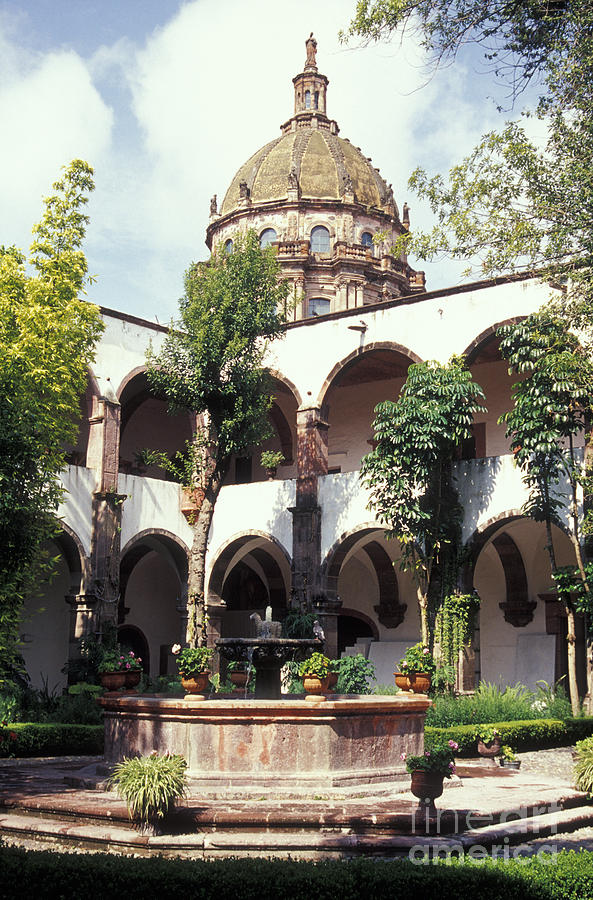
Bellas Artes Center, San Miguel de Allende, site of PEN WIPC conference, November 2002
In November 2002 the fourth WIPC meeting gathered in San Miguel de Allende, hosted by the PEN Center there in the charming old colonial town 170 miles from Mexico City where the 2003 PEN Congress would convene the following year. Forty-three PEN members from 25 centers from six continents gathered at the Bellas Artes center for a three-day conference followed by a meeting of the PEN Americas Regional Conference with the Latin American PEN Centers.
At the Bellas Artes center, originally the cloister of a convent, and in the Teatro del Artes PEN members met in workshops to review sources and methods as related to the threats of terrorism and anti-terror laws to freedom of expression, to review campaign techniques, PEN’s work at the United Nations, missions, regional networks, exile and asylum issues, borderline cases and finally strategies for the future. PEN’s WIPC set out to research a report in consultation with other organizations on the effect of anti-terrorism measures worldwide on freedom of expression, a report that would be presented at the 2003 PEN Congress.
In San Miguel PEN’s WIPC launched a report and a campaign “Freedom of Expression and Impunity Campaign” with an epigraph from Helen Mack, sister of anthropologist Myrna Mack, who was murdered in 1990 on orders carried out by the Guatemalan military. Helen Mack wrote:
Through my experience as co-plaintiff in the on-going trial to resolve the murder of my sister, Myrna Mack, I have seen impunity up close, along every step of this tortuous path in search of justice. I have felt it when essential information has been denied that would determine individual criminal responsibility; when judges and witnesses have been threatened; when the lawyers for the accused military officials use the same constitutional guarantees of due process in order to obstruct judicial procedures; and when my family, my lawyers, my colleagues and I have been threatened or been victims of campaigns to discredit us. In every action that is oriented toward generating impunity, one can clearly see the hand of agents of the State who use the same judicial and security institutions to pervert, once again, the goal of reparation through judicial means as well as the right to the truth and to justice.
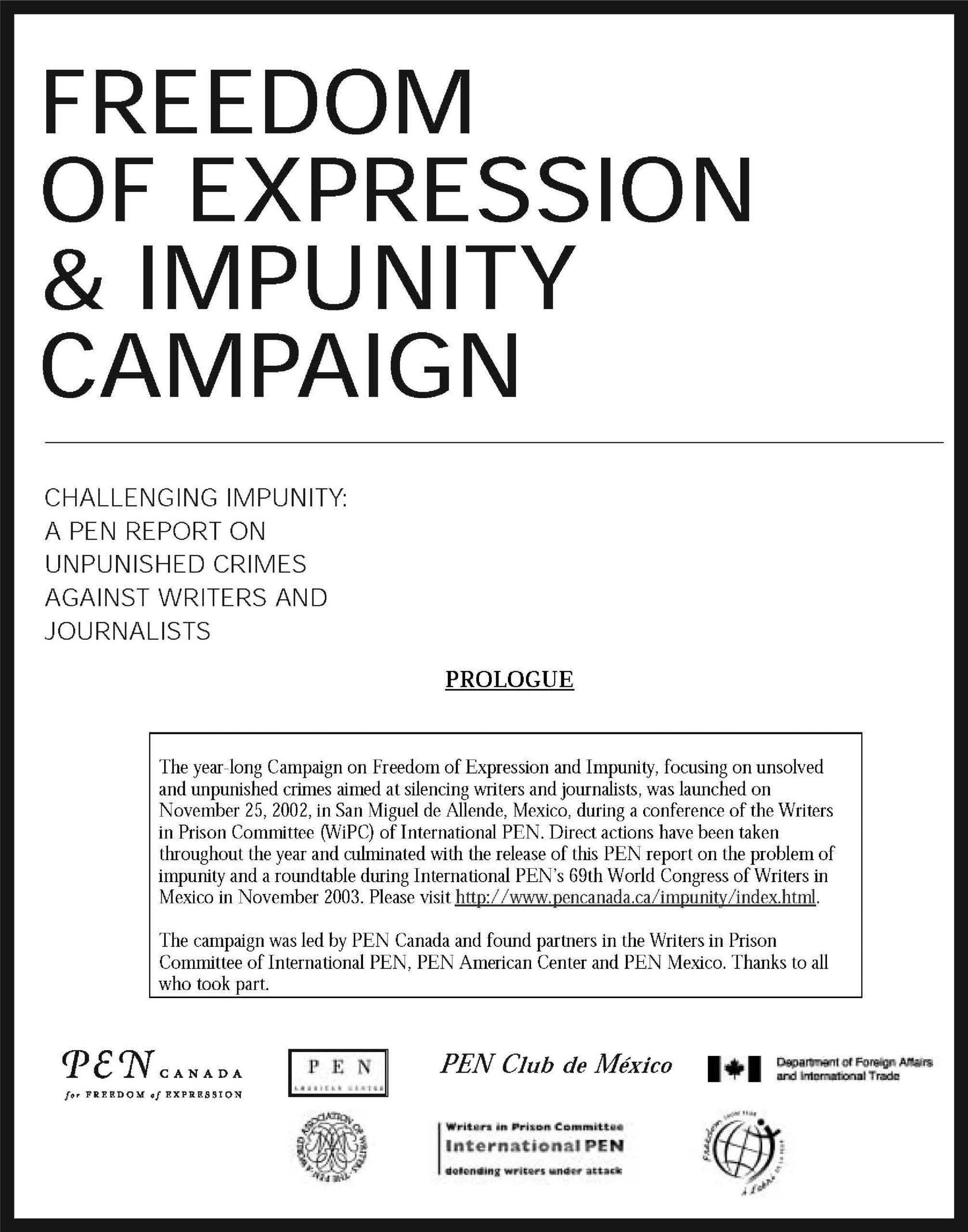
PEN International Impunity Report, launched at 2002 WIPC Conference, San Miguel de Allende
The Impunity report focused on Colombia, Iran, Mexico, Philippines, and Russia but PEN’s ongoing campaign targeted the issue wherever it occurred in the world.
Addressing the 2002 WIPC Conference and the Latin American Network was Brigadier General José Gallardo Rodriguez. At the Macedonian Congress earlier in the year PEN International President Homero Aridjis had reported on General Gallardo’s release. “Last February, I was invited to testify on behalf of PEN on General José Francisco Gallardo’s case, as one of three witnesses scheduled to appear before the Inter-American Court on Human Rights at a hearing in Costa Rica,” Homero said. “A few days before the hearing at which the Mexican Government was ordered to appear, he [Gallardo] was unexpectedly pardoned and released from jail, nine years after his arrest and imprisonment following the publication in the magazine Forum of an excerpt of his masters’ thesis about the need for a military ombudsman in Mexico. General Gallardo’s release was an important victory for freedom of speech and a significant advance of justice in Mexico. PEN Centers worldwide who defended Gallardo’s cause for eight years now celebrate the liberation of a Mexican Dreyfus.”
General Gallardo thanked International PEN for its invaluable support for having campaigned on his behalf, and he assured that he would continue to press for the creation of a military ombudsman.
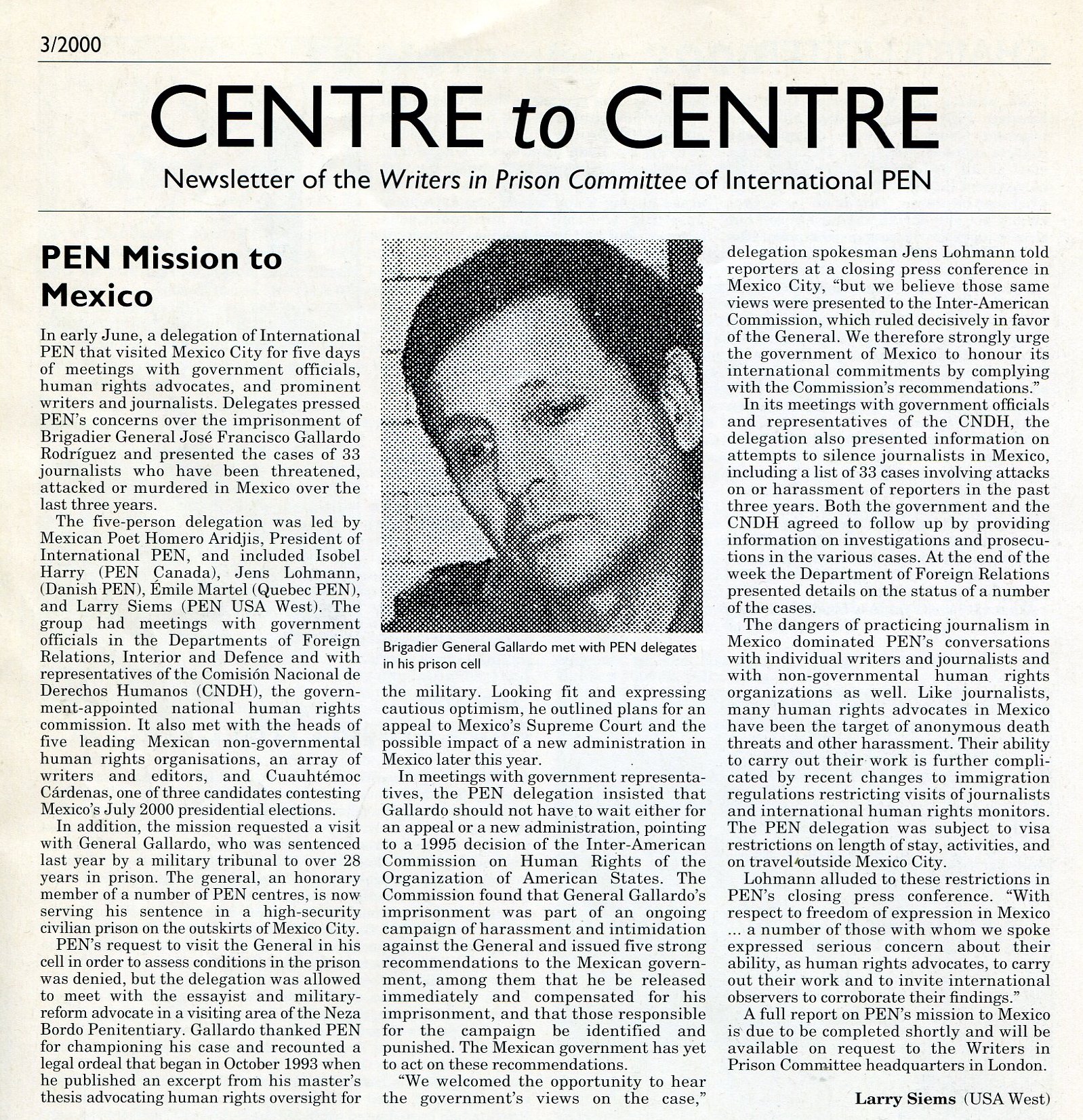
PEN WIPC newsletter 2000 on case of General José Gallardo Rodriguez
The Special Rapporteur on Freedom of Expression for the Organization of American States also participated on a panel on Corruption and the Writer, focusing on the problem of impunity, its link to corruption, its effect on free speech and the role of the writer in combating these problems.
Noting the increasing workload of the WIPC and the fact that the staff and budget had not grown at the same rate, several members suggested a Steering Committee of five individuals/centers be formed to assist the WIPC headquarters and work directly with committee chair Eugene Schoulgin and the WiPC staff led by Sara Whyatt. This group would formulate a strategy for the next three years, help define priorities and address the resources needed to achieve the goals. The proposal was accepted, and Isobel Harry (Canadian PEN), Archana Singh Karki (Nepal PEN), Jens Lohmann (Danish PEN), Lucy Popescu (English PEN) and Larry Siems (American PEN) formed the Planning Group. Their goal was to produce with the staff a plan that would be vetted by all WiPC members and approved at the Mexico Congress.
At the same time PEN International as a whole was undergoing a major strategic planning process. As the century turned, PEN International was in the midst of restructuring itself both to develop a more democratic governance system and also to address its rapid growth and funding challenges. In this process American PEN was an important actor, along with the Scandinavian and Japanese centers. American PEN, located in New York, was the largest of PEN’s centers and contributed more dues than any other center, but it had not hosted an International Congress since 1986 and did not host any of the international conferences or committee meetings. It had launched a World Voices Festival after 9/11 to bring international writers to the U.S. but this was an American PEN, not an International PEN, activity. However, with the assistance of two former American PEN presidents—Edmund (Mike) Keeley and Michael Scammell and American PEN Executive Director Michael Roberts and former PEN USA West President and International PEN Board member Eric Lax, the American contingent stepped up to raise funds from American foundations, including the Mellon Foundation and the Rockefeller Foundation to assist International PEN in a major strategic planning initiative. This consisted of several preliminary conferences in London and a final gathering at the Rockefeller estate in Bellagio, Italy.
The Americans, particularly Mike Roberts, PEN America’s Executive Director, understood that American PEN was only as strong as the whole body of PEN which at the moment had a very small hub or Secretariat for a very large wheel of 140 spokes. The core needed strengthening both structurally and financially. International Secretary Terry Carlbom, International PEN President Homero Aridjis, Deputy Vice Chair of the Board Carles Torner and the whole Board of PEN International, along with members of the board of the PEN International Foundation, Standing Committee Chairs, and several Vice Presidents agreed and committed to the strategic planning process.
During the last decades PEN had depended on funds from its centers and from UNESCO and from SIDA, the Swedish Development Association and a few other funders, but the world was changing and with it the sources of funding. U.N. organizations like UNESCO were under siege. Government funding for European and East European cultural organizations was evaporating; the same was true for other PEN centers. The challenge for PEN was structural and financial. No one knew what the 21st century would bring, but most everyone understood it would not be the same.
Next Installment: PEN Journey 28: Bellagio: Looking Forward—PEN for the 21st Century
PEN Journey 26: Macedonia—Old and New Millennium
PEN International celebrates its Centenary in 2021. I’ve been active in PEN for more than 30 years in various positions and now as an International Vice President Emeritus. With memories stirring and file drawers of documents and correspondence bulging, I am a bit of a walking archive and have been asked by PEN International to write down memories. I hope this personal PEN journey will be of interest.
I remember diving from a rowboat into Lake Ohrid and swimming in pristine water. I love to swim but never did so at PEN Congresses. However, the 68th Congress was held on one of Europe’s oldest—3 million years old—and deepest lakes which floated in the mountainous region between North Macedonia and eastern Albania. The water was the cleanest I had ever seen or felt. I swam without looking back until finally, I heard a voice from the boat shouting, “Come back! You’re almost in Albania!”

Moments before Isobel Harry (l) (Canadian PEN) and Joanne Leedom-Ackerman (r) (American PEN) dive into Lake Ohrid for a swim between meetings at the 68th PEN Congress in Ohrid, Macedonia in 2002
Albania, or rather the Albanian Liberation Army, a paramilitary organization, had recently been in conflict in Macedonia and was the reason PEN’s Congress there had been postponed the year before. (PEN Journey 25)
Swimming with me was my friend Isobel Harry, Executive Director of Canadian PEN, and in the boat sat Cecilia Balcazar from Colombian PEN and another PEN member. They watched over us in this break from the PEN meetings. My memories of the 2002 PEN Macedonia Congress include intense meetings of the Assembly in the Congress Hall of the old Soviet-style Metropol Hotel and neighboring Bellevue Hotel conference center and relaxed gatherings afterwards at lakeside cafes in the town of Ohrid, a UNESCO World Heritage site.
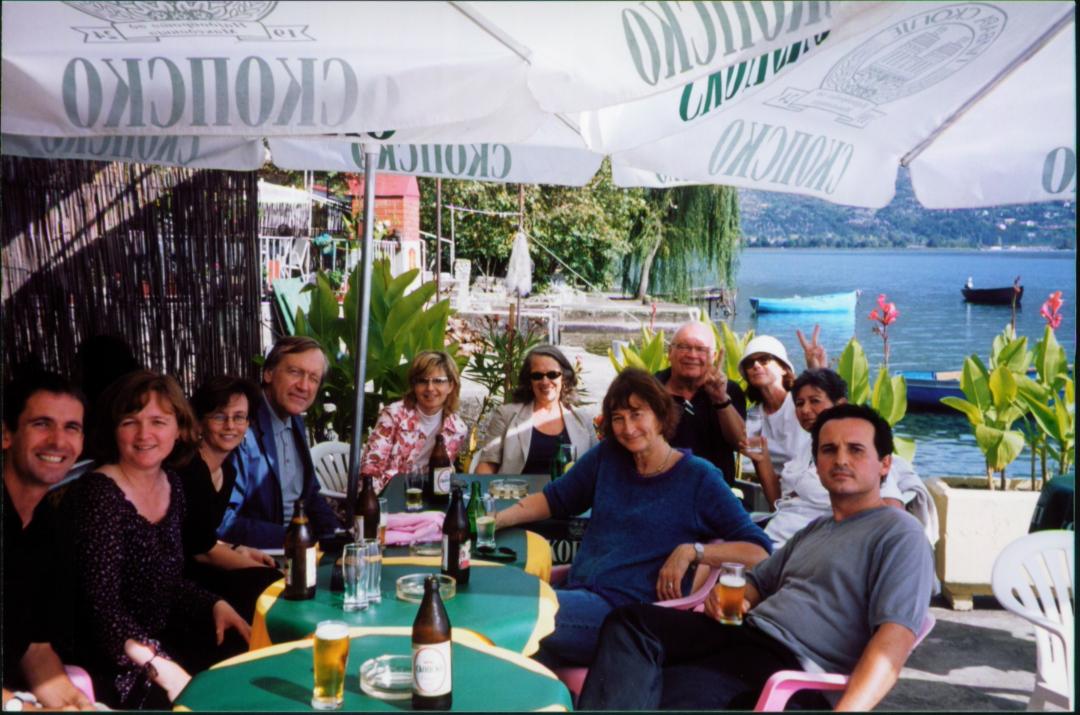
PEN colleagues at a lakeside cafe during the PEN Congress in Ohrid, Macedonia. (L to R) Dixie Willis and Sara Whyatt (WiPC staff), Susie Nicklin (English PEN), Eugene Schoulgin (Norweigan PEN & WiPC Chair), PEN member, Joanne Leedom-Ackerman (Vice President & American PEN), Niels Barfoed (Danish PEN), Isobel Harry (Canadian PEN), Fawzia Assaad (Swiss Romand PEN), Victoria Glendinning (English PEN), Carles Torner (PEN Board & Catalan PEN)
In the evenings we gathered for literary events with UNESCO-like titles—The Future of Language/Language of the Future and Borders of Freedom/Freedom of Borders. These were also the themes of the Congress. There was music and poetry in Macedonian and other languages I didn’t understand, recited in cavernous, shadowy chambers, including in the ancient Cathedral Church of St. Sophia, a structure from medieval times, rebuilt in the 10th century. Its frescoes still adorned the walls from Byzantine times in the 11th, 12th and 13th centuries and had been restored after the church was converted to a mosque during the Ottoman Empire.
While current politics and conflicts occupied the daytime work of PEN, history suffused the gathering. Civilization in Ohrid dated to 353 BC when the town had been known as “the city of light.”

Cathedral Church of St. Sophia in Ohrid
“The old millennium, especially in ‘old’ Europe, should, I believe, be left behind with all its anachronistic boundaries—geographical, historical, racial, ethnic, state, linguistic, religious and cultural—and give way to the unfolding of the new millennium, to its open-mindedness and tolerance,” Dimitar Baševski, President of Macedonian PEN, wrote in his introduction to the Congress. “For generations we in Macedonia have lived with a creed according to which culture and not warfare or power is perceived as the field for competitiveness among nations. The aims of the World Congress of International P.E.N. in 2002 perfectly correspond with the spirit of this creed.”
Over 300 people from 69 PEN Centers gathered in the hills of this North Macedonian city for the 68th World Congress. The Congress’ work included the activities and reports of PEN’s committees—Writers in Prison, Peace, Translation and Linguistic Rights, Women’s, Exile Network—and the PEN Foundation, PEN International Magazine, and PEN Emergency Fund. There was a proposed revision to PEN’s Charter removing the concept of literature as being national in origin; there was the introduction of new centers, the dissolution of inactive centers and the elections for the Board, Vice Presidents, and Search Committee. There was a report from the International Secretary on the renewal of PEN’s “formal consultative relations” with UNESCO for a further six years, a step that acknowledged PEN as the only voluntary organization and the only literary organization in this category and one of only 12 organizations with a “Framework Agreement.” PEN had also been reclassified as a Category II organization with ECOSOC (United Nations Economic and Social Council) which included organizations with “special competence in specific areas” such as Amnesty and Human Rights Watch, a category that reflected PEN’s status and contribution as the only world writers organization within the UN system. At PEN’s Assembly of Delegates attention was called to a dozen PEN conferences—last year’s and the year ahead—and finally the Assembly passed Resolutions from the Writers in Prison Committee and Peace Committee on the situations in Russia and Chechnya, Russia itself, the Middle East, Belorussia, China, Colombia, Cuba, Iran, Turkey, Zimbabwe, Uighur Writers, and Tatarstan
The aftermath of the 9/11 attacks on the United States the year before remained a focus that was altering the security landscape for nations around the world and for writers. PEN President Homero Aridjis observed, “Today our world is teetering on the brink of war.” He added, “In search of security, there have been encroachments on privacy and intrusive measures threatening freedom of expression and the right to dissent and criticize, but the global reach of information seems to have accelerated, proof of which is the current effort by the Chinese government to block its citizens’ access to the search-engine Google.”
“How can PEN and writers bring about positive changes?” he asked. “For a start, we could promote freedom of expression in Afghanistan. Not that long ago we were signing Internet petitions protesting against the treatment of women by the inhumane Taliban regime and begging the Taliban not to dynamite the colossal Buddhas of Bamiyan. Now I ask you to help me identify and approach Afghani writers who would be willing to found a PEN Center in Afghanistan and to try and find ways of giving this fledgling Center the means to thrive.”
[With the help of Norwegian PEN and others, an Afghan PEN Center was in fact founded with men and women writers from all ethnic groups and was voted into PEN at the 69th Congress the following year in Mexico. Writers in Prison Committee Chair Eugene Schoulgin played an instrumental role in working with and facilitating support for the Afghan writers.]
At the Macedonia Congress Eugene reported, “In my speech in London last November I mentioned the threats to the freedom of expression I feared that would follow the events of 9/11 in the US. What has happened last year has unfortunately proved these fears were well founded. Today over 40 countries have imposed new legislation on their populations which clearly weaken their human rights. New Anti-terror laws have been established in Canada, USA, UK, France, EU as a whole, Jordan, India and New Zealand. Terrorism laws expanded on Cuba and on Italy and in Colombia, Egypt, Zimbabwe, Israel, Russia, Uzbekistan, China and in the Philippines, and terror laws have been used as an excuse to crack down on the opposition and on minorities inside their regions. This in combination with the threats of a new war on Iraq makes the present situation extremely worrying, and will most certainly give us in the WiPC reason to be even more vigilant in the year to come.”
Visiting the WiPC Committee at the Congress were two former PEN main cases—Eşber Yağmurdereli, Turkish poet/dramatist and lawyer, who was blind and spent 14 years in prison and whom a number of us had met in Istanbul at a Freedom of Expression Initiative a few years before and Flora Brovina, a Kosovair/Albanian poet and doctor who had been abducted by Serbian troops and imprisoned in Belgrade during the NATO bombing. Flora’s son had contacted PEN which sent out an urgent appeal about her abduction. I had met her husband and family when I visited Pristina, Kosovo the year before with the International Crisis Group while she was still in prison. This was the first time I met Flora, who had become an internationally celebrated case and was a member the country’s Assembly. She told the Writers in Prison Committee that every letter sent to the prison by PEN served as another attempt to tear down the walls of the prison.
Esber Yagmurdereli said at present there were around 10,000 prisoners accused of being “terrorists,” but 90% of these should be considered prisoners of conscience, and many were simply students. “On 19 December 2000, the 20th day of the protest, I was playing chess with my friend in my cell,” he said. “He was a university student named Irfan. He was my son’s age–21 or 23 years old. He defeated me three tims. He said you are 60 years old. There are so many of us whose cases ar not covered in the press, but you do get attention. We need you as much as you need us. Then came the teargas. The protests took three yours. I myself lost consciousness and came to about an hour later. I learned that 32 people had been killed–burned to death. I learned that my friend Irfan was one of them.”
Russian journalist Anna Politkovskya also attended the Macedonian Congress. She told the WIPC meeting that she got threats from criminals, military and government. “I could stay in Vienna or elsewhere in the West, but it is my decision to be in Russia because I understand more than other people that if I couldn’t write articles or give radio talks, there would be no information about Chechnya,” she said. “Because travel to Chechnya is illegal, I need to prepare my trips as if I were a spy. I have to be strong, as far as I can. My children are in Moscow, and they are also threatened. ” My last meeting with Anna was sharing thick coffee at a tiny airport café in Skopje on our way home from the Congress.
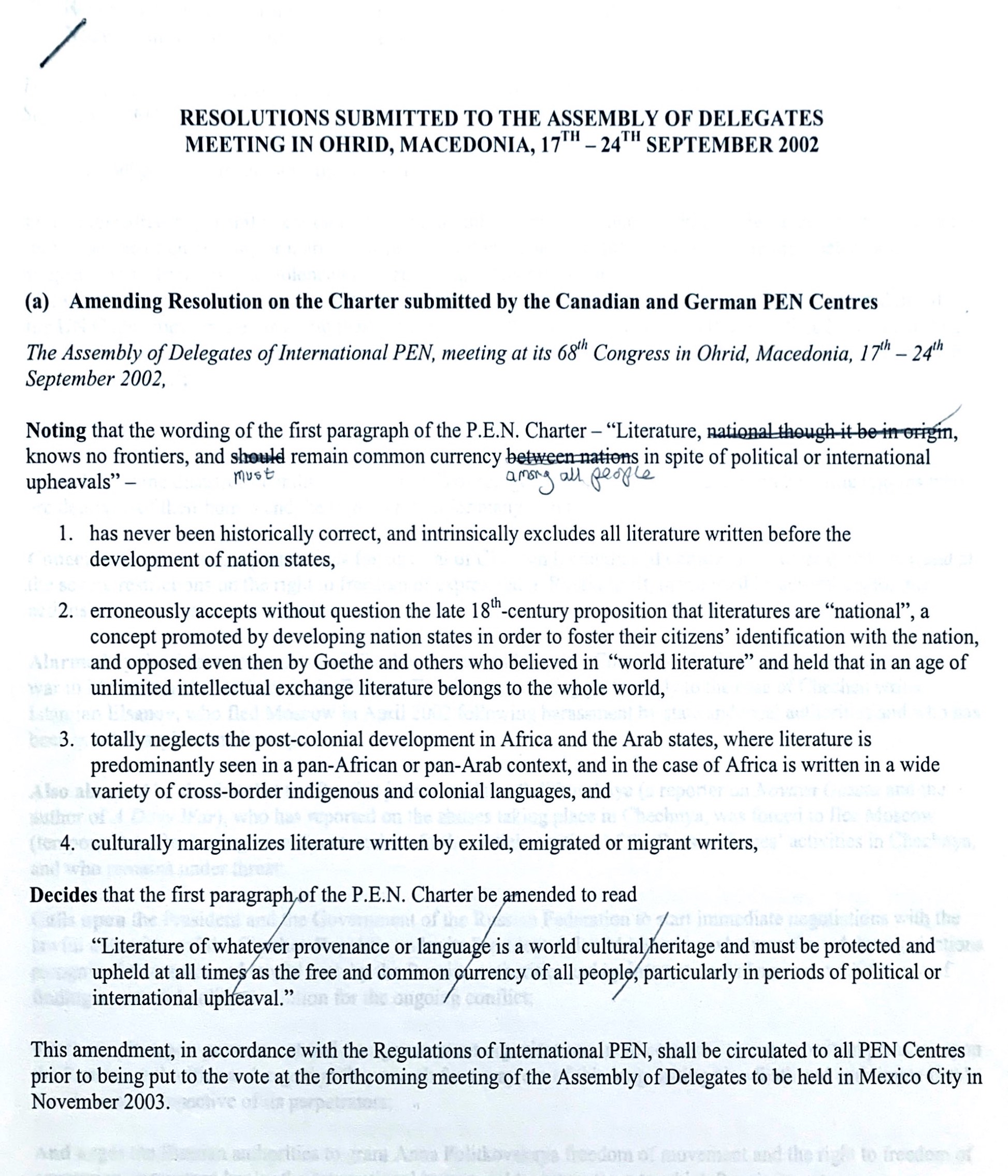
Resolution for change in wording of PEN’s Charter; amended wording, noted and approved, proposed by English PEN president Victoria Glendinning. Final proposal and approval to take place at Mexico Congress in 2003.
In addition to its traditional work, International PEN was proceeding with modernizing its governance and structure, led by International Secretary Terry Carlbom and the Board of PEN. Deputy Vice Chair of the Board Carles Torner reported that this included the restructuring of PEN and the PEN Foundation as British charitable tax law was changing; also new roles for the Vice Presidents were being considered; a modest change in the Charter was proposed for this Assembly to be confirmed at the next year’s Congress in Mexico, and the Treasurer was proposing a new international dues structure with a graded system, raising dues for centers from wealthier economies and reducing dues for others, based on the World Bank system of four categories. The change in the dues structure was unanimously approved.
Elections at the Congress included two new Vice Presidents Lucina Kathmann (San Miguel Allende PEN) and Boris Novak (Slovene PEN) and new Board members Takeaki Hori (Japan PEN), Cecilia Balcazar (Colombian PEN), Sibila Petlevski (Croatian PEN) and Elisabeth Nordgren (Finnish PEN).
“We are at the end of the first mandate of the first Board elected three years ago during the Warsaw Congress under the new Regulations.” Carles reported. “…we now have a real capacity for collective decision-making between Congresses…we are noticing that the transformation we dreamed of six years ago, when the new structuring of International PEN started, has taken place. There are more people involved in the work of International PEN, and each person represents a specific sensitivity within our international community…and we are better prepared to achieve our task now and in the future.”
The modernization and reform of governance also applied to PEN’s more than 130 centers with agreement that new centers from unrepresented parts of the world needed to be developed and centers that no longer functioned or worked in harmony with PEN’s Charter should be disbanded though there was often reluctance among PEN members to close a center.
At the Macedonia Congress, a particular PEN-like debate arose over the Langue d’Oc Center which no longer functioned. Langue d’Oc, or the Language of the Troubadours, was still spoken in a region in the South of France, in part of Italy and in one valley in Spain. The center’s president, whose name was the same as a great literary character, had worked on PEN’s Universal Declaration of Linguistic Rights with PEN’s Committee on Translation and Linguistic Rights half a dozen years before, and one member was still eager to keep the center going as a cause of minority languages. But the elderly outgoing President was not able to help, according to Jane Spender, PEN’s Administrative Director, who communicated or tried to communicate, with these centers. The center no longer functioned, had no office or contacts who replied, she reported. Before the center was declared closed, however, former International Secretary Alexander Blokh proposed that it be declared dormant and during the ensuing year French PEN writers who knew some of the members would “try to wake them up.” The Portuguese PEN delegate also offered to help as did the Esperanto, Slovene and Galician delegates. A similar lifeline was given to the inactive Welsh center by English PEN who agreed to perform the same role.
At PEN’s Congress the following year in Mexico, the interventions confirmed that after a year of dormancy neither center had rallied and so the Assembly voted to close the centers. In both cases new writers then came forward, and a few years later a new and active Welsh Center and Langue d’Oc Center formed and were elected back into PEN’s Assembly.
At the Macedonia Congress three brand new centers—Kyrghyz, Sierra Leone, and Tibet—joined the PEN family. It was in this fashion that PEN International pruned, renewed and broadened its base in civil society among nations and cultures and languages.
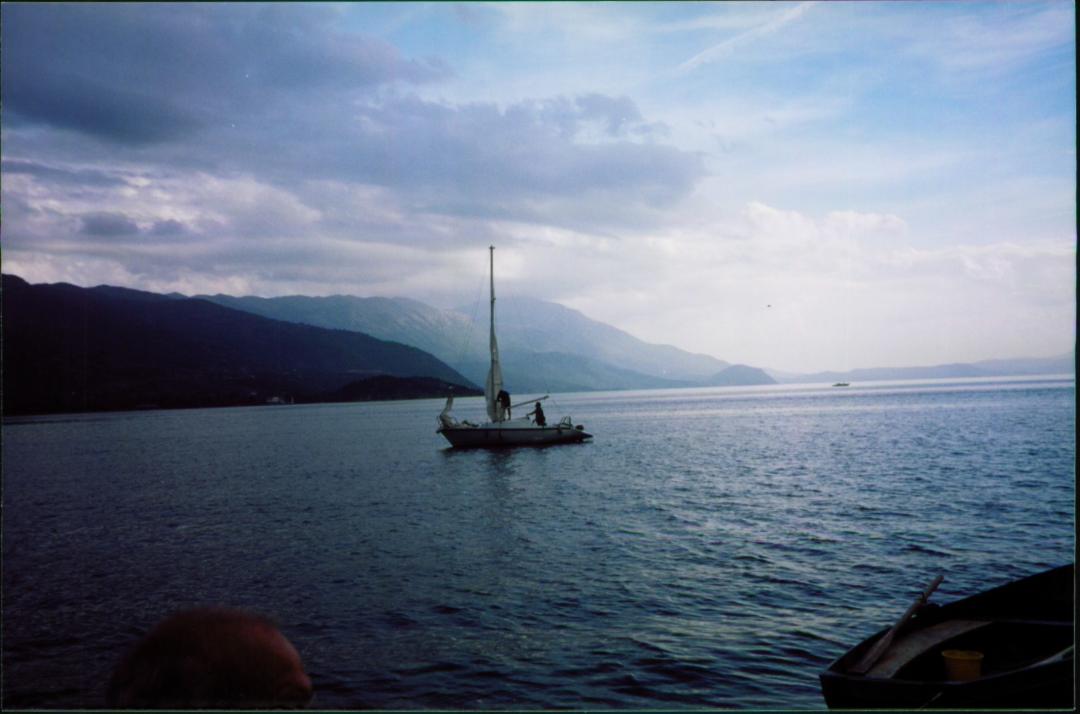
Lake Ohrid in the hills of North Macedonia between Macedonia and eastern Albania
Next Installment: PEN Journey 27: San Miguel Allende and Other Destinations–PEN’s Work Between Congresses
PEN Journey 14: Speaking Out: PEN’s Peace Committee and Exile Network
PEN International celebrates its Centenary in 2021. I’ve been active in PEN for more than 30 years in various positions and now as an International Vice President Emeritus. With memories stirring and file drawers of documents and correspondence bulging, I am a bit of a walking archive and have been asked by PEN International to write down memories. I hope this personal PEN journey might be of interest.
With a blue glacial lake surrounded by the Alps, a small island in the center with an ancient church with a Wishing Bell that rang out and promised fulfillment for the wishers, with a castle perched atop a hillside—with beauty and history intertwined through the landscape, Bled, Slovenia offered a stunning venue for PEN International’s Peace Committee meetings.
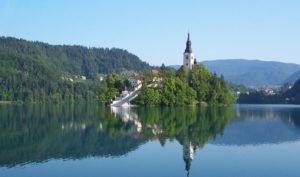
Bled, Slovenia
In the heart of Europe, the Peace Committee sat in the heart of a contradiction, for there were few places less peaceful than the Balkans. Yet Slovene PEN members played an important role as did other PEN members in bridging divides among writers in conflict zones.
At the Peace Committee’s inception in 1984, Slovenia was part of Yugoslavia, one of a handful of Communist countries after World War II whose writers were able to sign PEN’s Charter which endorsed freedom of expression. The other countries included Poland, East Germany, Czechoslovakia, Bulgaria, and Hungary. In 1962 a well-known Slovene writer, who was a member of English PEN but returned each year to Slovenia, championed the idea of resurrecting the Slovene PEN center which had existed before the war as well as the other two Balkan PEN Centers—Croatia and Serbia.
In 1965 writers from these Yugoslav centers took on the task of staging an International PEN Congress in Bled. At the congress Arthur Miller presided as the first and only American President of International PEN. At the ’65 Bled Congress PEN also hosted for the first time Soviet writers as observers. “Almost despite myself I began feeling certain enthusiasm for the idea of international solidarity among writers, feeble as its present expression seemed,” Miller wrote in his autobiography Timebends. “…I knew that PEN could be far more than a mere gesture of goodwill.”
It took almost 25 years before a Soviet, and later Russian, PEN Center emerged. [see PEN Journey 3, 6, 8] During the Cold War it was difficult for writers from the East and West to communicate, but at PEN congresses and meetings and at the Peace Committee, writers debated, exchanged ideas and shared literature. The Peace Committee became a haven during the Balkans War and also a meeting ground for writers from other conflict areas.
Unlike the Writers in Prison Committee which worked to protect and liberate individual writers, it was difficult at times to define the concrete actions the Peace Committee could take, but at least three stand out in my memory—one direct action, one initiative and one rigorous debate on a pressing issue.
As noted in an earlier post [PEN Journey 7] the head of Slovene PEN, Boris Novak ran the barricades during the Balkans War with aid for writers in the besieged Sarajevo as did Slovene poet and future Peace Committee Chair Veno Taufer and others. At the Peace Committee meeting in 1994 Boris reported 100,000 DEM ($60,000) had been contributed from PEN centers around the world and delivered to almost 100 Bosnian writers in order to save lives. When a new Bosnian center was elected at PEN’s Congress in late 1993, the Bosnian center began taking over the delivery of aid, and Boris was elected chair of the Peace Committee.
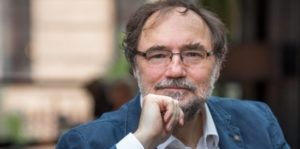
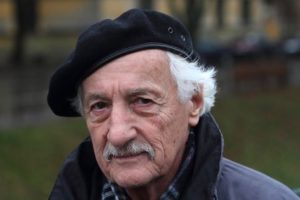
Boris Novak. Photo credit: The Bridge Magazine Veno Taufer. Photo Credit: Alchetron
I attended my first Peace Committee Conference as Chair of PEN’s Writers in Prison Committee in 1994 at the midway point of the Sarajevo siege. At the time PEN was also being asked to help writers who managed to get out of the city. In London I’d met one of these Bosnian writers and gave him my son’s old computer which he accepted as if I’d given him the keys to the city for he had no means to write. Writers fleeing not only the Balkans but situations in Africa and the Middle East needed support as they landed in new locations. It was at the Peace Committee meeting in 1994 that PEN’s Exile and Refugee Network was first conceived in partnership with the Writers in Prison Committee. The initiative was confirmed at the PEN Congress later that fall in Prague.
This initiative for exiles and refugees moved into an exploratory phase which became a leit motif in PEN’s work over the next two decades as it had been in the decades past. PEN’s Exile Network, spearheaded by PEN Centers, including Canada, Sweden, Norway, Germany, Belgium, England, America and many others took the initiative and offered residencies, aid and services to refugee and exiled writers arriving in their countries. Eventually PEN International formed a partnership with the expiring Parliament of Writers Cities of Asylum. In 2006 PEN became a founding member of ICORN—International Cities of Refuge Network. [More in future blog post]
The following year in 1995 the Peace Committee meeting in Bled featured a debate on hate speech, seen as both cause and effect in the conflicts. The gathering included such intellectual luminaries as Adam Michnik, an architect of Poland’s Solidarity movement and editor of the leading newspaper Gazeta Wyborcza in Warsaw. The debate was lively over the incendiary nature of hate speech and the limitations that should be imposed. Both in the Balkans War and in the civil war in Rwanda, which had just ended the year before, hate speech and writing fueled the strife. In spite of PEN’s advocacy for free expression, PEN also called on its members “to use what influence they have in favour of good understanding and mutual respect between nations and people” and pledge “to do their utmost to dispel all hatreds.” Even as “PEN declares for a free press and opposes arbitrary censorship,” it recognizes “freedom implies voluntary restraint” and members pledge “to oppose such evils of a free press as mendacious publication, deliberate falsehood and distortion of facts for political and personal ends.”
The very Charter of PEN contained the axis of the debate. What were or should be limits on expression? Should PEN take a position? At the 1995 Peace Committee conference and in debates since, the views tended to fall according to cultural and national experience. Those in Europe, Africa and elsewhere who had experienced effects of hate speech urged stricter limitations on speech; whereas Americans, bred on the First Amendment of the U.S. Constitution, remained wary of limits and argued that the answer to offensive speech was more speech, the drowning out of harmful ideas with inspiring ones. In my notes of the meeting and debate that year, I find no consensus or clear recommendation except for a reminder from one speaker who knew and quoted Russian exile and dissident Aleksandr Solzhenitsyn: “Don’t go against your conscience and don’t tell lies!”
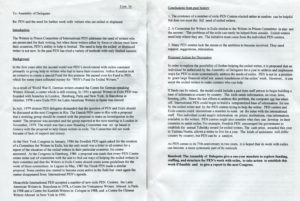
Proposal at 61st Congress for PEN to explore setting up an Exile Network. Resolution passed.
Next Installment: PEN Journey 15: Speaking Out: Life and Death
Arc of History Bending Toward Justice?
PEN International was started modestly almost 100 years ago in 1921 by English writer Catherine Amy Dawson Scott, who, along with fellow writer John Galsworthy and others conceived that if writers from different countries could meet and be welcomed by each other when traveling, a community of fellowship could develop. The time was after World War I. The ability of writers from different countries, languages and cultures to get to know each other had value and might even help reduce tensions and misperceptions, at least among writers of Europe. Not everyone had grand ambitions for the PEN Club, but writers recognized that ideas fueled wars but also were tools for peace.

Catherine Amy Dawson Scott and John Galsworthy
The idea of PEN spread quickly, and clubs developed in France and throughout Europe, the following year in America, and then in Asia, Africa and South America. John Galsworthy, the popular British novelist, became the first President. Members of PEN began gathering at least once a year in a general meeting. A Charter developed to focus the ideas that bound everyone. In the 1930s with the rise of Hitler, PEN defended the freedom of expression for writers, particularly Jewish writers. In 1961 PEN formed its Writers in Prison Committee to work systematically on individual cases of writers threatened around the world. PEN’s work preceded Amnesty, and the founders of Amnesty came to PEN to learn how it did its work. PEN’s Charter, which developed over a decade, was one of the documents referred to when the Universal Declaration of Human Rights was drafted at the United Nations after World War II.
Today there are over 150 PEN Centers around the world in over 100 countries. At PEN writers gather, share literature, discuss and debate ideas within countries and among countries and defend writers around the globe imprisoned, threatened or killed for their writing. The development of a PEN center has often been a precursor to the opening up of a country to more democratic practices and freedoms as was the case in Russia, other countries in the former Soviet Union and in Myanmar. A PEN center is also a refuge for writers in certain countries.
Unfortunately, the movement towards more democratic forms of government and freedom of expression has been in retreat in the last few years in a number of these same regions, including in Russia and Turkey.
As part of PEN’s Centennial celebrations, Centers and leadership at PEN International have been asked to share archives for a website that will launch in 2021. As I dug through my sizeable files of PEN papers, I came across this speech below which represents for me the aspirations of PEN, the programming it can do and the disappointments it sometimes faces.
At a 2005 conference in Diyarbakir, Turkey, the ancient city in the contentious southeast region, PEN International, Kurdish and Turkish PEN hosted members from around the world. The gathering was the first time Kurdish and Turkish PEN members shared a stage and translated for each other. I had just taken on the position of International Secretary of PEN and joined others at a time of hope that the reduction of violence and tension in Turkey would open a pathway to a more unified society, a direction that unfortunately has reversed.
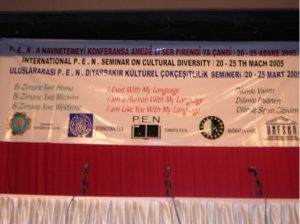
PEN Diyarbakir Conference, March 2005
This talk also references the historic struggle in my own country, the United States, a struggle which is stirring anew. “The arc of the moral universe is long, but it bends toward justice,” Martin Luther King and others have been quoted as saying. This is the arc PEN has leaned towards in its first century and is counting on in its second.
When I was younger, I held slabs of ice together with my bare feet as Eliza leapt to freedom in Harriet Beecher Stowe’s UNCLE TOM’S CABIN.
I went underground for a time and lived in a room with a thousand light bulbs, along with Ralph Ellison’s INVISIBLE MAN.
These novels and others sparked my imagination and created for me a bridge to another world and culture. Growing up in the American South in the 1950’s, I lived in my earliest years in a society where races were separated by law. Even after those laws were overturned, custom held, at least for a time, though change eventually did come.
Literature leapt the barriers, however. While society had set up walls, literature built bridges and opened gates. The books beckoned: “Come, sit a while, listen to this story…can you believe…?” And off the imagination went, identifying with the characters, whatever their race, religion, family, or language.
When I was older, I read Yasar Kemal for the first time. I had visited Turkey once, had read history and newspapers and political commentary, but nothing prepared me for the Turkey I got to know by taking the journey into the cotton fields of the Chukurova plain, along with Long Ali, Old Halil, Memidik and the others, worrying about Long Ali’s indefatigable mother, about Memidik’s struggle against the brutal Muhtar Sefer, and longing with the villagers for the return of Tashbash, the saint.
It has been said that the novel is the most democratic of literary forms because everyone has a voice. I’m not sure where poetry stands in this analysis, but the poet, the dramatist, the artistic writer of every sort must yield in the creative process to the imagination, which, at its best, transcends and at the same time reflects individual experience.
In Diyarbakir/Amed this week we have come together to celebrate cultural diversity and to explore the translation of literature from one language to another, especially to and from smaller languages. The seminars will focus on cultural diversity and dialogue, cultural diversity and peace, and language, and translation and the future. This progression implies that as one communicates and shares and translates, understanding may result, peace may become more likely and the future more secure.
Writing itself is often an act of faith and of hope in the future, certainly for writers who have chosen to be members of PEN. PEN members are as diverse as the globe, connected to each other through 141 centers in 99 countries. They share a goal reflected in PEN’s charter which affirms that its members use their influence in favor of understanding and mutual respect between nations, that they work to dispel race, class and national hatreds and champion one world living in peace.
We are here today as a result of the work of PEN’s Kurdish and Turkish centers, along with the municipality of Diyarbakir/Amed. This meeting is itself a testament to progress in the region and to the realization of a dream set out three years ago.
I’d like to end with the story of a child born last week. Just before his birth his mother was researching this area. She is first generation Korean who came to the United States when she was four; his father’s family arrived from Germany generations ago. I received the following message from his father: “The Kurd project was a good one! Baby seemed very interested and has decided to make his entrance. Needless to say, Baby’s interest in the Kurds has stopped [my wife’s] progress on research.”
This child will grow up speaking English and probably Korean and will also have a connection to Diyarbakir/Amed because of the stories that will be told about his birth. We all live with the stories told to us by our parents of our beginnings, of what our parents were doing when we decided to enter the world. For this young man, his mother was reading about Diyarbakir/Amed. Who knows, someday this child who already embodies several cultures and histories, may come and see this ancient city for himself, where his mother’s imagination had taken her the day he was born.
It is said Diyarbakir/Amed is a melting pot because of all the peoples who have come through in its long history. I come from a country also known as a melting pot. Being a melting pot has its challenges, but I would argue that the diversity is its major strength. In the days ahead I hope we scale walls, open gates and build bridges of imagination together. –Joanne Leedom-Ackerman, International Secretary, PEN International
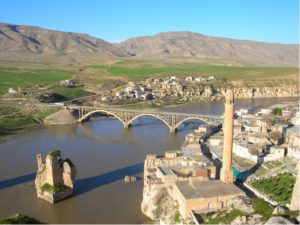
Reclaiming Truth In Times Of Propaganda
PEN International’s 83rd Congress in Lviv, Ukraine took on truth and words, history and memory, women’s access and equality, cyber trolling, fake news and threats to freedom of expression worldwide, including public panels focused on the three super powers: “America’s Reckoning—Threats to the First Amendment in Trump’s America,” “China’s Shame—How a Poet Exposed the Soul of the Party,” and “Putin’s Power Play—The Decline of Freedom of Expression in Russia.”
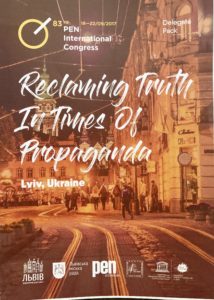
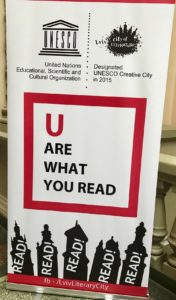
At its annual gathering PEN hosted more than 200 writers, editors, staff and visitors from 69 PEN centers around the world in the historic city of Lviv, the Cultural Capital of Ukraine and a UNESCO World City of Literature. Straddling the center of Europe, on the fault lines between East and West, Lviv changed its name and governing domain eight times between 1914 and 1944, passing from the Austro-Hungarian Empire to Russia, back to Austria, Ukraine, Poland, Soviet Union, Germany then back to the Soviet Union and now finally in the Ukraine.
The path of European history cuts through the city and can be seen in architecture, culture and conversation. Though writers celebrated literature in the western Lviv, fighting was still underway in eastern Ukraine and the Crimea. PEN’s Russian center didn’t attend the Congress at the same time a new PEN St. Petersburg center was elected. Other new centers joining PEN’s network included Cuba, the Gambia and South India.
In times of war, the first casualty is truth, noted PEN’s report “Freedom of Expression in Post-Euromaidan Ukraine: External Aggressions, Internal Challenges.” The report and the Congress addressed the aggressive role of propaganda in conflict. In Ukraine, in Russia and worldwide there has been a proliferation of false narratives.
PEN’s report on Ukraine noted: “Despite significant improvements, democracy in Ukraine remains ‘a work in progress’ and, among other things, severe challenges to the enjoyment of the right to free expression remain. These include the use of the media to foster political interests and agendas, delays in reforming state-owned media; and intimidation and attacks on journalists followed by impunity for the perpetrators. On the other hand, public criticism is growing, albeit slowly, including demands for more transparent and unbiased journalism.”
In Russia authorities are taking increasingly extreme legal and policy measures against freedom of expression, according to a PEN/Free Word Association report “Russia’s Strident Stifling of Free Speech.”
No writers are in prison in Ukraine, but in the Crimea, which Russia annexed in 2014, filmmaker Oleg Sentsov, an opponent of annexation, was arrested and is now serving a 20-year sentence inside a Russian prison on terrorism charges he denies. At PEN’s Assembly, delegates remembered Pavel Sheremet with an Empty Chair. A Belarusian-born Russian journalist and free speech advocate, Sheremet wrote for an independent news website and hosted a radio show where he reported and commented on political developments in Ukraine, Russia and Belarus. He died in a car bomb explosion in Kiev July, 2016. Shortly before he was assassinated, he’d written about corruption among law enforcement in Belarus, Ukraine and propagandists in Russia. His murder remains unsolved.
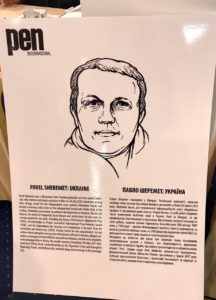
Resolutions at the Congress also addressed writers imprisoned in Turkey, China, Vietnam, Kazakhstan, and Eritrea and killings in Mexico, Russia, Venezuela, Bangladesh and India. Concerns about increasing censorship in Hungary, Poland, India, Turkey, and Spain were acted on as was the restriction of linguistic rights for Kurdish writers in Turkey, Hungarians in Ukraine and Uyghurs in China.
Expressing concern about the abuse of Interpol’s Red Notice system by some member states “in order to repress freedom of expression or to persecute members of political opposition beyond their borders”, PEN called on the Council of Europe “to refrain from carrying out arrests…when they have serious concerns that the notice in question could be abusive.”
PEN expanded Article 3 of its Charter for the first time since the document’s inception over 90 years ago. The Assembly voted new language which would include a wider mandate, reaching beyond just opposing hatreds of race, class and nations to include by extension gender, religion and other categories of identity. Article 3 of PEN’s Charter, which can be linked to here, now reads: “Members of PEN should at all times use what influence they have in favor of good understanding and mutual respect between nations and people; they pledge themselves to do their utmost to dispel all hatreds and to champion the ideal of one humanity living in peace and equality in one world.”
PEN also passed a Women’s Manifesto noting “the use of culture, religion and tradition as the defense for keeping women silent as well as the way in which violence against women is a form of censorship needs to be both acknowledged and addressed.”
At the Opening Ceremony author of East West Street Philippe Sands, whose grandfather was born in Lviv, narrated the origins of international human rights law and the concepts “crimes against humanity” and “genocide.” These legal frameworks were developed by two lawyers who passed through the very university where the delegates sat. The legal teams prosecuting at the Nuremberg trials after World War II used these frameworks to secure convictions, including the conviction of Hans Frank, Hitler’s lawyer who governed the area around Lviv and sent over 100,000 Jews to concentration camps and death.
“The Foundations of human rights law came from here,” Sands said. “Every individual has rights under international law.” The lawyers Hersch Lauterpacht and Raphael Lemkin studied at the university at different times and never met. One escaped to Austria then England, the other to America. Lauterpacht protected the rights of the individual with the concept he developed of “crimes against humanity” and Lemkin protected the group with the legal construct for “genocide.” Both men were on the legal teams that successfully secured convictions at Nuremberg.
“No organization in the world knows better than PEN the need to protect individuals and to protect others,” Sands concluded.
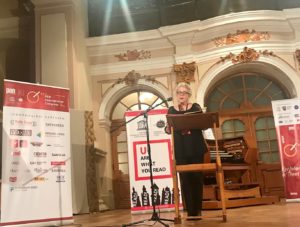
Jennifer Clement, PEN International President
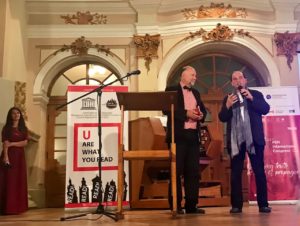
Andrei Kurkov from Ukranian PEN and Carles Torner, Executive Director PEN International
At the closing ceremony author David Patrikarakos focused on the current situation as the 21st century unfolds and addressed “Fact, Fiction and Politics in a Post Truth Age.” He told the story of Vitali, who became a troll for the Russian state working at a Troll farm. “When Vitali went to the Troll farm, he had enlisted in the Russian Army; he just didn’t wear a uniform. He and others became their own army with a virtual information war, and it is effective,” said Patrikarakos.
As an unemployed journalist, Vitali developed propaganda, rewriting reports, doctoring news accounts to enhance Russia’s position then distributed these on social media, along with fake news, fake pictures and memes to a wide audience, all relating to Russia’s assault on the Crimea. According to Patrikarakos (Nuclear Iran: The Birth of an Atomic State), who has also written for the New York Times, Financial Times, Guardian, and Wall Street Journal, the Russian state spent $250 million to sow discord in its battle for Crimea.
In the Troll farm where Vitali and other journalists worked, the first floor focused on distorting news reports and circulating them. On the second floor people worked through social media, posting memes and making up ads; on the third floor bloggers wrote about how life was better in Russian and bad for Russians in the Ukraine and on the fourth floor, people posted comments on other sites.
According to Patrikarakos and his sources, there was a bag of sim cards to request new accounts, and people were encouraged to make the accounts in the names of females because women were more likely to be believed. “The first goal was to shore up and get true believers, to give a narrative and sow as much confusion on reality as possible,” Patrikarakos said.
After three months Vitali told his boss he wanted to quit. He wrote an expose of the Troll farm. When it came out, he received threats such as “Don’t you know you can get punched in the face.”
“As I went through towns of Eastern Ukraine, content had seeped into walls,” said Patrikarakos. “In Eastern Ukraine, Putin’s nervous system is on display. There is belief in fake news—that Ukrainians want to kill Russian speakers. Social media is supposed to connect us but it has also shattered unity and divided people; it sets people at loggerheads. The news that young people get depends on who they follow. We all follow who we like, and so prejudice is reaffirmed. Facts are less important than narratives. The new word in 2016 from the Oxford dictionary was ‘post-truth’ which is finding linguistic footing. The goal of many is not to trust truth but to subvert truth,” he concluded.
What can we do to counter this trend? Patrikarakos advised:
- Go out of your way to see people who don’t think like you.
- Go directly to the source of information and go to the news.
- Read those you don’t agree with.
- Read books. (Patrikarakos’ new book is More Than 140 Characters)
- Mistrust the mob.
- Beware of Click bait.
- Click off.